
by Christin Brown | February 17, 2021 | News Releases
Philadelphia, PA – February 17, 2021 − State Senator Christine Tartaglione has been appointed by Senate Democratic Leader Jay Costa as a member of the Pennsylvania Election Law Advisory Board, a 23-member bipartisan panel created by the legislature in 2020 to review and make recommendations to improve the Pennsylvania Election Code.
“Free and fair elections are the foundation of our system of self-government as Americans and as Pennsylvanians. I am honored that Leader Costa has appointed me to serve on the Election Law Advisory Board, which will work to maintain the integrity and improve the efficiency of all elections in the Commonwealth,” Senator Tartaglione said.
The Election Law Advisory Board exists under Article XIII-E of the Election Code and was added to the code on March 27, 2020. The panel consists of the Secretary of State or the secretary’s designee, the President Pro Tempore of the Senate or designee, the Minority Leader of the Senate or designee, the Speaker of the House or designee, and the Minority Leader of the House or designee. It also consists of one appointee by the Governor from each of Pennsylvania’s 18 congressional districts, with no more than half of the appointees representing the same political party.
The duties of the board are to study the entirety of the Election Code and identify statutory language to repeal, modify, or update; to collaborate with other agencies and political subdivisions of the Commonwealth to study election-related issues; to study the development of new election technology and voting machines; and to evaluate and make recommendations on improving the electoral process in the Commonwealth and implementing best practices identified to ensure the integrity and efficiency of the electoral process.
The board is further charged with publishing, by the end of each fiscal year, extensive and detailed findings on the Joint State Government Commission’s publicly accessible website. These findings are to be made available in electronic format to the Office of the Governor and members of the General Assembly.
Montgomery County Commissioner Ken Lawrence has been named chairperson of the board by a unanimous vote of board members.
# # #
If you would like more information about this topic, please contact William Kenny at 215-533-0440 or William.Kenny@pasenate.com.
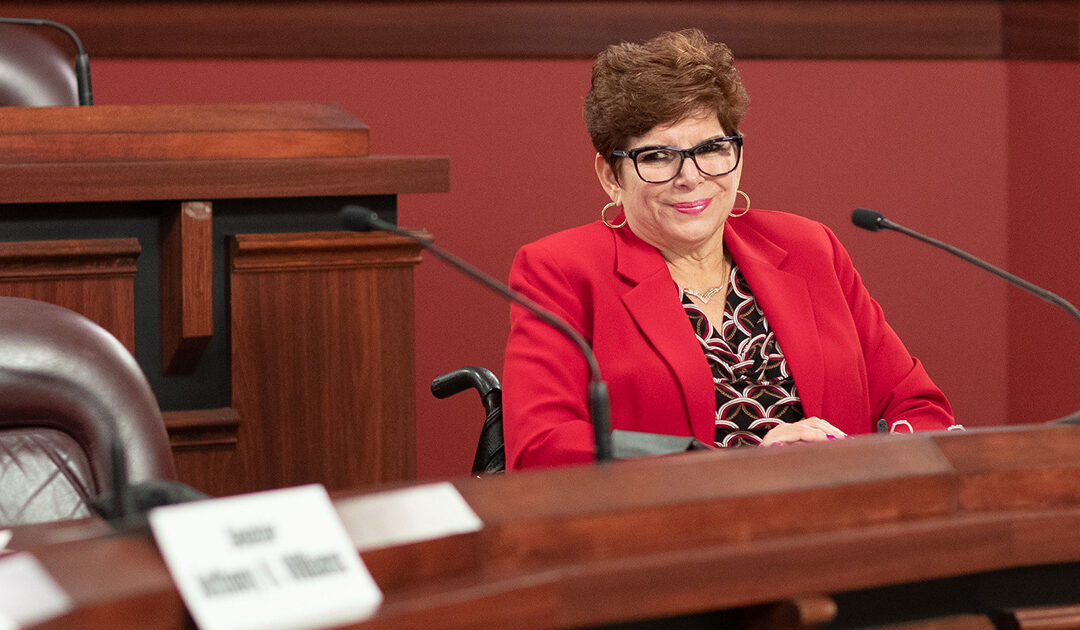
by Christin Brown | February 3, 2021 | News Releases
During his Fiscal Year 2021-2022 Budget Address, Governor Wolf discussed minimum wage, small business funding, job creation, and workforce development
Philadelphia, PA – February 3, 2021 – State Senator Christine Tartaglione released the following statement in response to the Fiscal Year 2021-2022 Budget Address delivered today by Governor Tom Wolf during a joint session of the Pennsylvania General Assembly:
“I have long fought within the General Assembly for policies that improve the lives of Pennsylvania’s workers, their families, and their communities. In light of the COVID-19 pandemic, these priorities are more important now than they have ever been. I applaud Governor Wolf for incorporating my agenda into the administration’s proposals, and for sharing my vision of a Commonwealth defined by equality and opportunity for all.
“With approximately 5 million Pennsylvanians having filed for unemployment benefits since March, we must focus on putting people back to work. I fully support the new round of small business assistance requested by the governor as well as his recommendation that Pennsylvania reinvest federal pandemic funding into remediating toxic materials in our schools. Projects like those will keep our school children safe and create good-paying jobs.
“The governor and I agree it is vital that Pennsylvania raise its minimum wage. The current rate, $7.25 an hour, amounts to a poverty wage. Raising the rate to $12 this year and $15 over the next six years will allow low-wage earners to work their way out of poverty while improving morale and productivity, and reducing their reliance on public assistance. As a result, my minimum wage legislation, SB 12, will also benefit employers, taxpayers, and our consumer economy. Importantly, it will help advance income equality for women and minorities.
“Our budget must serve the Commonwealth’s urgent job creation needs, but we must also look ahead and consider how we will help prepare Pennsylvanians for employment opportunities of the future. The governor’s proposed investment in a reformed workforce development system will enable Pennsylvanians to acquire marketable job skills and will help rebuild the middle class. And it will also help to remove the barriers to employment faced by many folks, such as transportation and childcare needs.
“Overall, I am very encouraged that Governor Wolf has prioritized sorely needed pandemic relief and recovery initiatives while reiterating his long-standing advocacy for the pro-worker and pro-family agenda that we share. I look forward to working with the administration and my legislative colleagues during the upcoming budget process to achieve these objectives.”
# # #
If you would like more information about this topic, please contact William Kenny at 215-533-0440 or William.Kenny@pasenate.com.
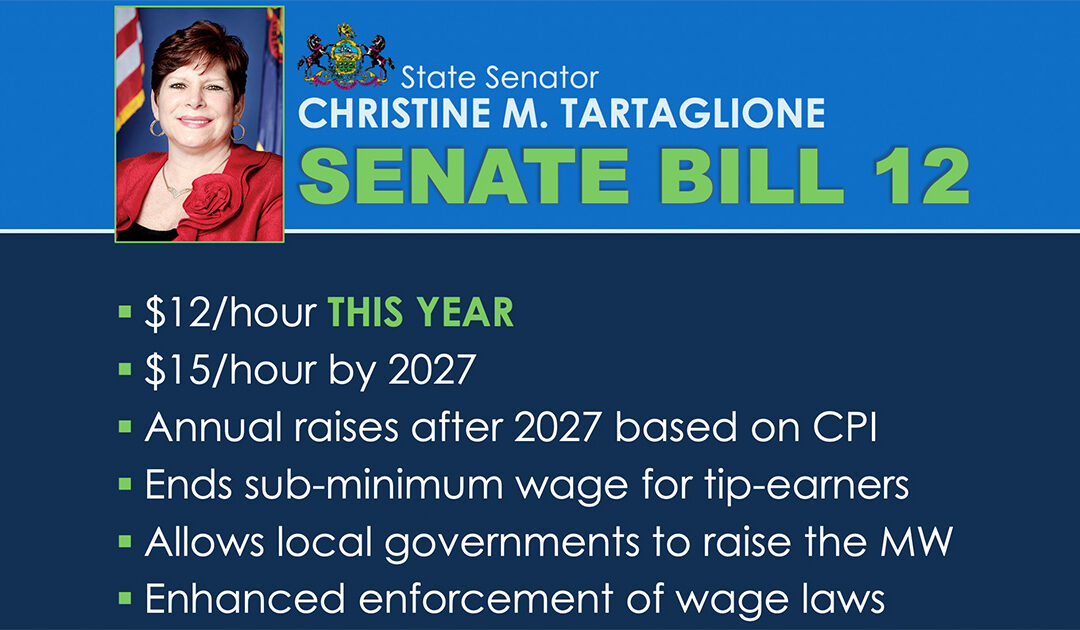
by Christin Brown | January 27, 2021 | Minimum Wage, News Releases
Download Facts → | Download Full Remarks →
The forthcoming Senate Bill 12 would raise Pennsylvania’s minimum wage to $15 per hour, while the Raise the Wage Act of 2021 would boost the federal rate to the same level
Philadelphia, PA – January 27, 2021 – Pennsylvania’s minimum wage workers haven’t received a substantial pay raise in more than 14 years. Today, State Senator Christine Tartaglione (D-Philadelphia) and U.S. Rep. Brendan Boyle (D-Pennsylvania) detailed their efforts to raise the minimum wage for the Commonwealth and for the nation as new legislative sessions commence in Harrisburg and Washington, D.C.
During a virtual meeting with the news media, Senator Tartaglione announced she will soon introduce legislation that would raise Pennsylvania’s Minimum Wage to $12 per hour this year and put the Commonwealth on a path to a $15 minimum wage. The bill will be known as Senate Bill 12.
Congressman Boyle discussed the Raise the Wage Act of 2021 which was introduced in the U.S. House yesterday, January 26th. The bill proposes to gradually raise the federal minimum wage to $15 per hour and has garnered the support of U.S. House and U.S. Senate leaders. President Biden has called upon Congress to adopt a $15 federal minimum wage as part of his economic recovery plan.
Currently, Pennsylvania’s minimum wage is $7.25 per hour, the same rate as the federal minimum. The Pennsylvania legislature last raised the minimum wage on June 30, 2006, through Senate Bill 1090. Senator Tartaglione was the primary sponsor of that bill, which raised the state’s minimum wage from $5.15 to $7.15.
Three years later, Congress raised the federal minimum wage to $7.25, and Pennsylvania’s rate followed suit.
“It has been 5,317 days since the Pennsylvania Legislature last raised the minimum wage. That is more than 14 years and it is far too long,” Senator Tartaglione said, echoing language she enters into the Senate record every session day. “At the current rate, a full-time minimum wage worker earns just $15,000 a year. That’s certainly not enough for anyone to live on – even a single person with no children or dependents. It is a poverty wage. Raising the minimum wage is not just an economic issue. It’s a moral issue.”
“No American who works full time should be living in poverty,” said Congressman Boyle. “Americans working 40 hours a week should be able to put food on the table and a roof over their families’ heads, but with the minimum wage stuck at $7.25, far too many are working hard and still in poverty. Even before the COVID-19 pandemic, the $7.25 federal minimum wage was economically and morally indefensible. Now, the pandemic is highlighting the gross imbalance between the productivity of our nation’s workers and the wages they are paid. Raising the federal minimum wage to $15 will be a boost to the economy, a boost to productivity, and a boost to our workforce. Raising wages is good business.”
On a state level, Senate Bill 12 would raise the minimum wage to $12 this year and an additional 50 cents each year until it reaches $15. After then, the rate would be adjusted annually based on the Consumer Price Index. In addition, Senator Tartaglione’s legislation would eliminate the sub-minimum wage for tip-earners (which is currently set at $2.83 per hour) and would repeal preemption, which prevents local governments in the Commonwealth from raising the minimum wage in their jurisdictions. Further, Senate Bill 12 would grant the Department of Labor & Industry more powers to investigate wage law violations and would increase the penalties for employers who violate wage laws.
Senator Tartaglione noted that as recently as 2019, one statewide survey of registered voters found that 69% favor raising the minimum wage to $12. Another survey that year found that 56% of voters support a $15 minimum wage. Twenty-nine states have adopted minimum wages higher than the federal rate, including all six of Pennsylvania’s immediate neighbors. Nine states have adopted a $15 minimum wage.
“The level of support for these raises will only grow as consumer prices climb and it becomes harder for low-wage workers to make ends meet, and it becomes near-impossible for them to get ahead,” Senator Tartaglione said. “If New York, New Jersey, and Maryland can have a $15 minimum wage, and if Florida voters can approve a $15 minimum wage, surely Pennsylvania can do it.”
# # #
If you would like more information about this topic, please contact William Kenny at 215-533-0440 or William.Kenny@pasenate.com.
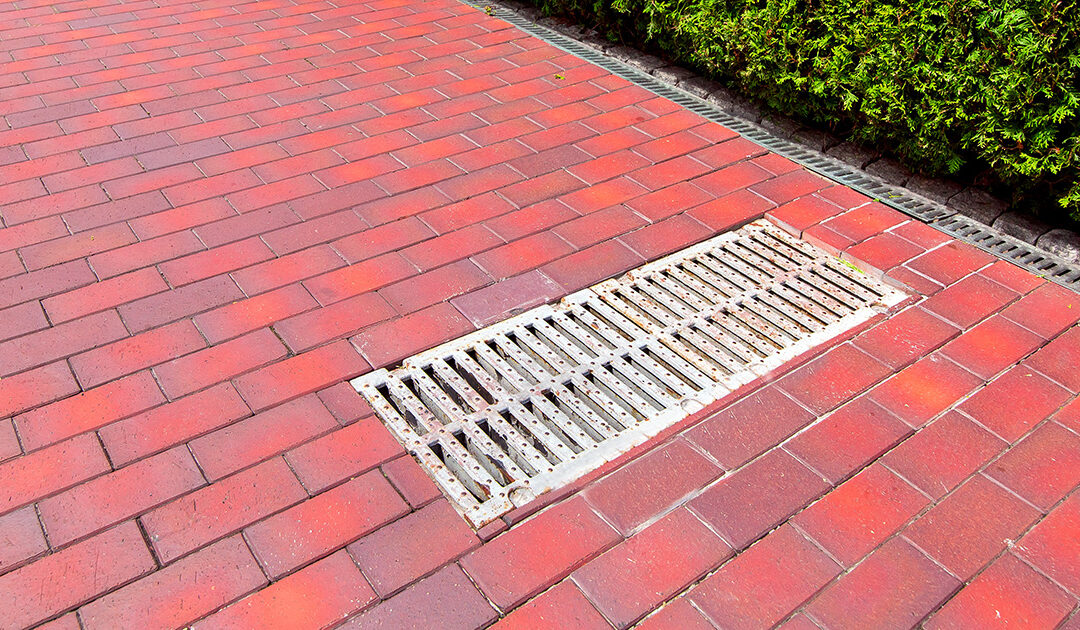
by Christin Brown | January 20, 2021 | News Releases
The City of Philadelphia will use the funds to construct 31 green stormwater infrastructure systems, helping to manage more than 13 acres of drainage area in the public right of way.
Philadelphia, PA – January 20, 2021 – State Senator Christine Tartaglione is pleased to announce that the Pennsylvania Infrastructure Investment Authority (PENNVEST) board today approved a $6.7 million loan to the City of Philadelphia for the rehabilitation of the stormwater collection system in the Lawncrest neighborhood.
The approved financing will be used to construct 31 green stormwater infrastructure systems, including tree trenches, stormwater bumpouts, and stormwater trees. These systems will manage more than 13 acres of drainage area in the public right of way in Lawncrest. They will reduce the amount of stormwater entering the city’s combined sewer system in the area and help to prevent sewer overflows into local streams and the public water supply.
“Even in a dense urban area like Lawncrest in the heart of one of the nation’s largest cities, environmental protection must be our utmost concern,” Senator Tartaglione said. “Projects like this reduce the amount of contaminated wastewater that, during major storm events, overflow our over-burdened sewers and drain into local waterways like the Tacony Creek and ultimately the Delaware River.”
The project will help the city to satisfy the requirements of a Pennsylvania Department of Environmental Protection Consent Order and Agreement mandating that the city reduce combined sewer overflows. A combined sewer is a system in which household wastewater and stormwater are drained through the same network of underground pipes. Most of Philadelphia is served by combined sewers.
During major storm events, the volume of stormwater can fill the system and cause untreated wastewater to overflow sewer inlets. This untreated wastewater poses threats to public health, community health, and aquatic health.
For more information about the City of Philadelphia’s efforts to manage stormwater, visit the Philadelphia Water Department website: https://www.phila.gov/water/wu/stormwater/Pages/StormwaterManagement.aspx
# # #
If you would like more information about this topic, please contact William Kenny at 215-533-0440 or William.Kenny@pasenate.com.

by Christin Brown | January 18, 2021 | Minimum Wage, News Releases
Harrisburg – January 18, 2021 – At the request of State Senators Art Haywood (D-Montgomery/Philadelphia), Christine Tartaglione (D-Philadelphia), and John Kane (D- Chester/Delaware) the Pennsylvania Senate Democratic Policy Committee held a virtual public hearing on raising the minimum wage for Pennsylvanians. The hearing was held on Martin Luther King, Jr’s Day of Service to honor his legacy of fighting for worker’s rights and economic justice.
“It is unacceptable that Pennsylvania continues to allow its minimum wage to be the poverty wage of $7.25 an hour,” Haywood said. “We hold this hearing today on Martin Luther King, Jr. Day of service to continue the work that Dr. King started demanding dignity and respect for all workers, and that starts by paying workers a living wage.”
The Pennsylvania General Assembly last raised the minimum wage in July 2007 to $7.25 per hour. The six states bordering Pennsylvania have enacted minimum wage laws exceeding the $7.25 rate effective in the Commonwealth. Maryland, New York, New Jersey, Delaware, West Virginia, and Ohio have enacted higher minimum wages than Pennsylvania’s, which has been stagnate at the federal minimum for more than a decade.
Alissa Barron-Menza, Vice President of Business for a Fair Minimum Wage, said that minimum wage was first introduced in 1938 during the Great Depression, and that a livable minimum wage is an essential economic recovery tool.
“This increase is a vital tool for shared recovery that will be good for business, good for customers and good for the economy,” Barron-Menza said.
Morris Pearl, Chairman of the Patriotic Millionaires, also said that a raise to the minimum wage is good for the economy. He said that a strong economy needs people with money to spend in order to maintain it.
“Investors are overwhelmingly in favor of raising the minimum wage,” Pearl said.
Currently, 29 states and the District of Columbia have minimum wages above the federal minimum wage of $7.25 per hour, including all states surrounding Pennsylvania.
“The fact that Pennsylvania’s General Assembly hasn’t raised the minimum wage since passing my legislation in 2006 is reprehensible,” Tartaglione said. “While I have continued to sponsor new minimum wage legislation every session since, the majority has failed to take action, leaving the last increase workers have seen to be a 10-cent federal increase in 2009. Pennsylvania’s minimum wage workers deserve better.”
Sen. Tartaglione is the prime sponsor of Senate Bill 12. This legislation would immediately raise Pennsylvania’s minimum wage to $12 an hour for all Pennsylvania workers, with a pathway to $15 an hour by 2027. This bill would also eliminate the tipped minimum wage for Pennsylvania, ensuring all workers are making a living wage that is not dependent on patron generosity or lack thereof.
“I was a union plumber for almost four decades, and I know how important livable, family-sustaining wages were for myself and all of our members,” Kane said. “It’s a big problem that our minimum-wage workers haven’t seen a raise in over a decade — we need to guarantee that all Pennsylvanians are paid a livable wage.”
Gene Barr is President & CEO of the PA Chamber of Business and Industry said that his organization does not believe that a raise to the Pennsylvania minimum wage is the most, “effective way to drive assistance.”
Barr said that a raise to the minimum wage will hurt small businesses, will lead to more automation, and that continued work with the state on reducing barriers to employment and expanding an Earned Income Tax Credit (EITC) are better solutions.
“There is majority business support for raising the minimum wage beyond currently enacted levels – despite what you may hear from the opposition,” Barron-Menza countered to Barr. “For example, a 2016 survey of 1,000 business executives across the country conducted by LuntzGlobal for the Council of State Chambers found that 80 percent of respondents said they supported raising their state’s minimum wage, while only eight percent opposed.”
“No one should be working a full-time job, or multiple full-time and part time jobs, and still be living in poverty because their employer is not required to pay them a livable wage,” Sen. Katie Muth (D- Berks/Chester/Montgomery), chair of the Senate Democratic Policy Committee, said. “All workers deserve the dignity and respect of a livable wage, and we must raise the minimum wage for Pennsylvania.”
William Spriggs, Professor of Economics at Howard University and Chief Economist at AFL-CIO stated in his testimony that raising the minimum wage is also essential in ending the gender and racial wage gaps widely acknowledged to exist by economists.
Spriggs also said that subminimum wage is paying people less in the service industry ($2.83 in Pennsylvania for restaurant workers) or is biased on where they live, and also has, “very racist roots.”
Ashona Denise Osborne joined the SEIU (Service Employees International Union) fight for $15 an hour minimum wage after working minimum wage jobs her whole life, raising her son as a single mother, and realizing that even getting her Associates Degree in childcare is, “still not enough.”
Many other Senators also attended this hearing including Senate Democratic Leader Jay Costa (D- Allegheny), Amanda Cappelletti (D- Delaware/Montgomery), Carolyn Committa (D- Chester), Maria Collett (D- Bucks/ Montgomery), Wayne Fontana (D- Allegheny), Vincent Hughes (D- Montgomery/Philadelphia), Tim Kearney (D- Chester/Delaware), Steve Santarsiero (D- Bucks), Nikil Saval (D- Philadelphia), Judy Schwank (D- Berks), Sharif Street (D- Philadelphia), Anthony H. Williams (D- Delaware/Philadelphia), and Lindsey Williams (D- Allegheny).
Below are all who testified in today’s hearing:
- Gene Barr, President & CEO of the PA Chamber of Business and Industry
- Alissa Barron-Menza, Vice President of Business for a Fair Minimum Wage
- Morris Pearl, Chair of Patriotic Millionaires
- Manuel Rosaldo, Centre County Wage Justice Coalition, Assistant Professor of Labor Relations, Penn State University
- Jacqui Rogers, Bucks County Women’s Advocacy Coalition
- William Spriggs, Professor of Economics, Howard University and Chief Economist, AFL-CIO
- Kadida Kenner, Director of Campaigns at the PA Budget and Policy Center
- Ashona Denise Osborne, SEIU Worker from Pittsburgh
- Lateefah Curtis, Worker from Philadelphia
- Adesola Ogunleye, Worker from Philadelphia
The full recording of this hearing can be found at senatormuth.com/policy.
###
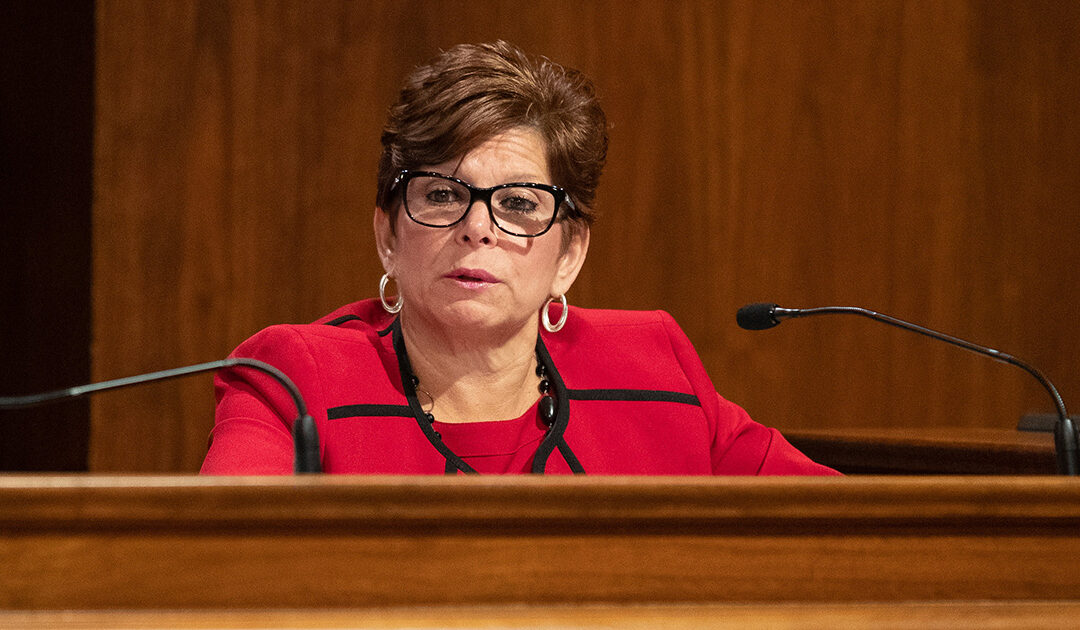
by Christin Brown | January 15, 2021 | News Releases
Philadelphia, PA – January 15, 2021 – State Senator Christine Tartaglione has been reappointed as the Democratic Chairwoman of the Senate Labor & Industry Committee for the 2021-2022 session and as a member of the following Senate standing committees: Law & Justice, Banking & Insurance, and Consumer Protections & Professional Licensure. The Senator has also been appointed to the bicameral Legislative Budget & Finance Committee as well as the Senate Committee on Ethics.
Senator Tartaglione will be joined on the Labor & Industry Committee by Democratic Caucus members Senators John Kane, Tim Kearney, and Lindsey Williams.
“I am honored and excited to begin the important work of the Labor & Industry Committee in the new Senate session and to continue to fight for the issues that are most important to the working people of the Commonwealth,” Senator Tartaglione said. “We have many urgent priorities such as raising the minimum wage, protecting workers from COVID-19 and other workplace threats, as well as improving the unemployment compensation system. I look forward to working with my colleagues from both sides of the aisle to benefit all Pennsylvania families.”
For additional information about the Senate Labor & Industry Committee, visit https://www.legis.state.pa.us/cfdocs/CteeInfo/index.cfm?Code=13&CteeBody=S
For the full list of Senate standing committees, visit https://www.legis.state.pa.us/cfdocs/CteeInfo/StandingCommittees.cfm?CteeBody=S
# # #
If you would like more information about this topic, please contact William Kenny at 215-533-0440 or William.Kenny@pasenate.com.
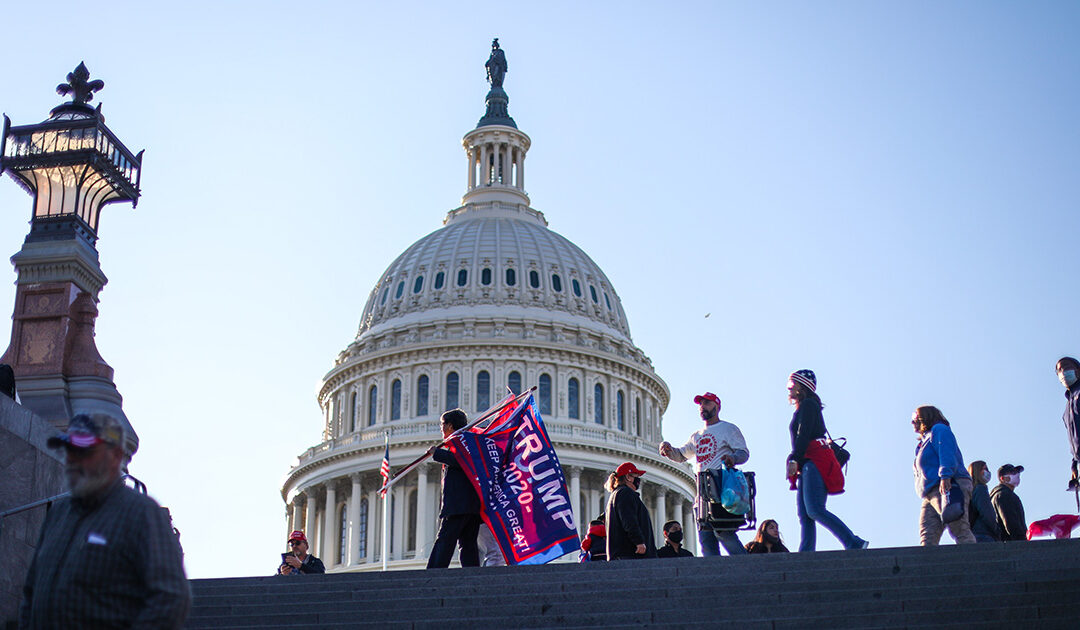
by Christin Brown | January 6, 2021 | News Releases
Harrisburg, PA – January 6, 2021 – The PA Senate Democrats released the following statement on the violent protest today in the nation’s Capitol:
The First Amendment is one of our most sacred. It is not political and it is not partisan. The rights to free speech, assembly and petition are what allow this country to flourish. However, those rights do not permit the violence we are seeing today in the nation’s Capitol building and in state capitols across this country.
We held an election in November, and now – like every four years – we must have a peaceful transition of power. Our form of government cannot survive without it.
Without qualification or equivocation, we condemn the actions at the US Capitol Building today. We are asking protestors to stand down and leave peacefully.

by Christin Brown | December 24, 2020 | News Releases
Grant recipients include Impact Services, Carl Mackley Houses, Esperanza Health Center, Friends of Father Judge High School, Fox Chase Cancer Center, Frankford Library, and the future Trinity PAL Center, Moss Rehab, and Temple University.
Philadelphia, PA – December 24, 2020 − State Senator Christine Tartaglione (D-Philadelphia) today announced that $10 million in Redevelopment Assistance Capital Program (RACP) grants have been awarded in support of nine community development projects in and around the 2nd Senatorial District.
“I am proud and honored to provide these diverse and community-focused organizations with this critical state funding,” Senator Tartaglione said. “The projects represented here will serve local families and the entire Philadelphia region by improving access to housing, commercial real estate, healthcare services, education, and youth engagement programs. I look forward to continue working with all of these organizations as they improve the lives of the people of the 2nd Senatorial District.”
RACP grants were awarded to the following organizations and projects:
- Impact Services; A & Indiana Campus – Philadelphia; $1,000,000; Impact Services is proposing to develop a 140,000 sf former textile mill to improve the Kensington neighborhood of North Philadelphia by renovating an existing 140,000 sf Mill Building, into a mixed-use project including affordable housing (financed separately) and a multi-tenant community serving building. The renovations will include all new systems, floors, historic windows, roofing, elevators, stairs and finishes. The project will also include completion of site work and parking for access to the building.
- Carl Mackley Houses Limited Partnership; Carl Mackley Affordable Housing Reconstruction (1401 E. Bristol St.); $1,000,000; Project includes restoration of the 4 buildings’ facades and replacement of the bricks where necessary. Including exterior masonry restoration, including deconstruction of exterior walls; manufacturing of replacement jumbo bricks; and reconstruction of the exterior walls with existing and replacement bricks. RACP funds are also requested for replacement of the window enclosures where the masonry restoration will occur.
- Esperanza Health Center; Community Medical Care & Wellness Campus-Kensington-Esperanza – Phase 3 (861 E. Allegheny Ave.); $1,000,000; A new community wellness center will be built at 3222-58 H Street, Philadelphia, PA 19134, developing an open lot that has been vacant for 13 years into a modern facility serving Kensington community residents. It will include a gymnasium, fitness room with exercise equipment, multi-purpose rooms for health education and wellness activities and a conference center.
- Friends of Father Judge High School, Inc.; FOFJHS Career Pathways Academy (3301 Solly Ave.); $500,000; The Career Pathways Academy Building would be a state-of-the-art 20,000sqft two story building built for the purpose of delivery high level vocational education & workforce development. The Oblate Faculty House will be knocked down to make room for the new structure. The structure would have a massive common area for multiple trade disciplines to be taught simultaneously while 3 classrooms and additional breakout spaces would be created on the 1st floor. The second floor will have additional workshop spaces, offices for instructors, and an observation deck for Administrators.
- American Oncologic Hospital d/b/a Fox Chase Cancer Center; Fox Chase Cancer Center ICU Modernization (333 Cottman Ave.); $1,500,000; The project involves the construction of a 15 bed ICU in an addition that will be connected to the current ICU space. This addition will be built on slab and protrude into a beautiful open courtyard in the center of the Fox Chase campus. When construction of the new unit is complete we will break thru the outer ICU wall and connect the spaces. Move all functions into the new space and renovate the current ICU space for waiting, consult room and storage.
- Free Library of Philadelphia Foundation; Renovation of Frankford Library (4634 Frankford Ave.); $1,000,000; The programmatic functions of library-as-community and civic meeting space-as-community are separated by floors but connected by the café which, in turn, acts as a link to the street. From the outside in, the designs include sidewalk upgrades, new landscaping, signage, lighting and a new entry awning and curtainwall glazing, lobby improvements to activate and make more welcoming the space, new meeting and study rooms enclosed with glass partitions at the rear of the main level rear, lower level reconfiguration to provide an additional meeting room, consolidation of existing storage spaces to create a new staff workspace, kitchen renovation, insertion of a new passenger elevator, and main stair reconfiguration.
- Kinder Academy Development Organization; Trinity PAL Center (6901 Rising Sun Ave.); $1,000,000; The project will entail the construction of a new state-of-the-art, historically compatible facility to house the return of the Gibbons PAL program and other community outreach initiatives. Initial construction plans include a basketball court with high ceiling, homework room(s), restrooms, office space for program officers. We also envision additional space that could be used for supplemental community programming. With a commitment from Trinity Church Oxford and the Episcopal Diocese of Pennsylvania, construction could commence on the existing property as part of a long-term lease agreement/endowment covering all operating and maintenance expenses.
- Albert Einstein Healthcare Network; Einstein Medical Center Elkins Park/MossRehab (60 Township Line Road); $1,000,000; The project will include renovation and expansion of the current 4th floor Brain Injury Center to include a robotics gym. The pharmacy at this location will also undergo renovations to meet safety standards and regulatory guideline. Patient rooms will be renovated to reflect safety needs in light of the COVID-19 pandemic.
- Temple University – Of the Commonwealth System of Higher Education; Ritter Hall – Institute on Disabilities and Sponsored Projects relocation (1301 Cecil B. Moore Ave.); $2,000,000; Project will relocate the Institute on Disabilities and Sponsored Projects to a newly renovated central suite within the College of Education’s Ritter Hall Complex. Project will include complete renovation of 14,395 SF space. The architectural design promotes wellness, productivity and efficiency, forming a new academic experience while creating a collaborative working environment and includes new reception areas, conference rooms, offices (both private and open) and support spaces. In addition, all MEP systems and technology will be upgraded to meet the needs of the new space.
RACP is a Commonwealth grant program administered by the Office of the Budget for the acquisition and construction of regional economic, cultural, civic, recreational, and historical improvement projects. These projects have a regional or multi-jurisdictional impact and generate substantial increases or maintain current levels of employment, tax revenues, or other measures of economic activity.
# # #
If you would like more information about this topic, please contact William Kenny at 215-533-0440 or William.Kenny@pasenate.com.

by Christin Brown | December 23, 2020 | News Releases
The Senator urged her General Assembly colleagues to authorize grants to small businesses that have been adversely affected by the pandemic.
Philadelphia, PA – December 23, 2020 – State Senator Christine Tartaglione (D-Philadelphia) applauded today’s announcement by Governor Tom Wolf of his intent to transfer $145 million from the state’s Workers’ Compensation Security Fund into the General Fund so that they may be reallocated for pandemic-related small business relief. Senator Tartaglione also urged her General Assembly colleagues to grant the legislative authorization required to appropriate the funds as grants to small businesses adversely affected by the pandemic.
“I have said throughout the COVID-19 pandemic that we must strive to protect the financial health of workers and their families in addition to their physical health,” Senator Tartaglione said. “The preservation of small businesses such as restaurants and taverns, gyms, and independent entertainment venues, which employed some 2.5 million Pennsylvanians prior to the pandemic, is vital to protecting these jobs.”
In addition to the legislative authorization requirement, the transfer carries a requirement that the Workers’ Compensation Security Fund be reimbursed the full $145 million on a later date. Since the start of the pandemic (March 11th), the Pennsylvania Department of Labor & Industry has received 12,926 new workers’ compensation claims. In 2019, the Department reported 10,071 total claim petitions.
The Pennsylvania Senate Democratic Caucus prioritized a new round of pandemic relief funding for small businesses in their initial PA CARES proposal issued in October, which included $575 million in assistance for bars, taverns, and restaurants; barbers, salons, and the personal care industry; tourism; Main Street and historically disadvantaged businesses; and nonprofit organizations. The Republican-led General Assembly took no action on this proposal and instead used $1.3 billion in remaining federal CARES Act funding to balance the state budget.
Earlier this month, Senate Democrats introduced a new $4 billion PA CARES 21 plan, which includes $800 million in relief for small businesses, with $300 million exclusively for restaurants, taverns, and others in the hospitality industry.
“These businesses are taking on massive debts just to keep their lights on and keep enough staff in place to prepare for the day when they can start rebuilding their businesses again,” Senator Tartaglione said. “They are doing everything they can to improve health protections for patrons and staff. We have an obligation to make them whole.”
For more information about the PA CARES 21 proposal, visit www.pasenate.com/pacares.
# # #
If you would like more information about this topic, please contact William Kenny at 215-533-0440 or William.Kenny@pasenate.com.

by Christin Brown | December 10, 2020 | News Releases
HARRISBURG – December 10, 2020 – Today the following members of the Pennsylvania State Senate signed a joint statement – set forth below – denouncing the brazen attempt of the attorneys general of Texas and seventeen other states to disenfranchise millions of Pennsylvanians and voters in three other states by asking the United States Supreme Court to prevent electors in Pennsylvania and those other states that voted for Joe Biden from certifying him the winner when they meet in Harrisburg and the other state capitals on Monday, December 14.
The statement reads as follows:
“The lawsuit by the attorneys general of Texas, Alabama, Arkansas, Florida, Indiana, Kansas, Louisiana, Mississippi, Missouri, Montana, Nebraska, North Dakota, Oklahoma, South Carolina, South Dakota, Tennessee, Utah and West Virginia is based on the outright lie that voter fraud prevented Donald Trump from getting re-elected. Since Election Day, the Trump legal team has filed scores of such suits trying to overturn the will of the people. Time and again, the judges in those matters – in many cases conservative, Republican judges, some of whom Donald Trump appointed himself – have found that there was no evidence to support those claims and dismissed the suits accordingly.
The bedrock of our democracy is the right to vote and the right of voters to be sure that their votes will be counted. This lawsuit and the others like them are a direct attack on that fundamental principle. It seeks to perpetuate the lie that the presidential election was somehow stolen. While partisan politics – and a desire to appease the president’s restive base – may be the motivation for this latest court challenge, allowing it to go forward in silence is dangerous and, we believe, would constitute a dereliction of our duty as elected representatives of the people to uphold the Constitution of the United States and the Constitution of the Commonwealth of Pennsylvania.
The facts are these: Joe Biden received over 81 million votes, more than any candidate for president in the history of the United States and about 7 million more than Donald Trump. He received 80,555 more votes than the president in Pennsylvania. Mr. Biden received the most votes in 25 states and the District of Columbia, and, therefore, on December 14 when the Electoral College convenes, will be awarded 306 electoral votes, 36 more than the 270 needed to be elected president. Every vote cast for Joe Biden was cast freely and fairly, whether in person or by mail. In each state the vote-counting process was transparent and undertaken pursuant to law. Local and state officials, both Republican and Democratic alike, have attested to those facts, and, as noted, the courts have agreed. Joe Biden won the election.
Donald Trump has lost his bid for re-election; he seems incapable of accepting that fact. For the first time in American History, a sitting president who lost re-election has refused to acknowledge his loss, acting instead like a would-be autocrat who cannot accept any outcome that does not have him staying in power. While that may be a commentary on the character of the man, it cannot be a cause for setting aside the will of the people.
All of us have a responsibility – indeed we would go so far as to say a sacred duty – to ourselves, our fellow Americans and generations to come to prevent the lie that this election was stolen from living on and undermining future elections. For these reasons we have signed this statement and call upon others to likewise speak out and denounce this lawsuit against our state for what it is: an attack on our democracy.”
Signed,

Senator Steve Santarsiero, 10th District

Senator Vincent Hughes, 7th District

Senator Maria Collett, 12th District

Senator Judy Schwank, 11th District

Senator Tim Kearney, 26th District

Senator Christine Tartaglione, 2nd District

Sen.-Elect Amanda M. Cappelletti, 17th District

Sen.-Elect Carolyn Comitta, 19th District

Senator Jay Costa, 43rd District

Senator Anthony H. Williams, 8thDistrict

Senator Katie Muth, 44th District

Senator Art Haywood, 4th District

Senator Sharif Street, 3rdDistrict

Senator Lindsey Williams, 38th District

Sen.-Elect Nikil Saval, 1st District

Sen.-Elect John Kane, 9th District
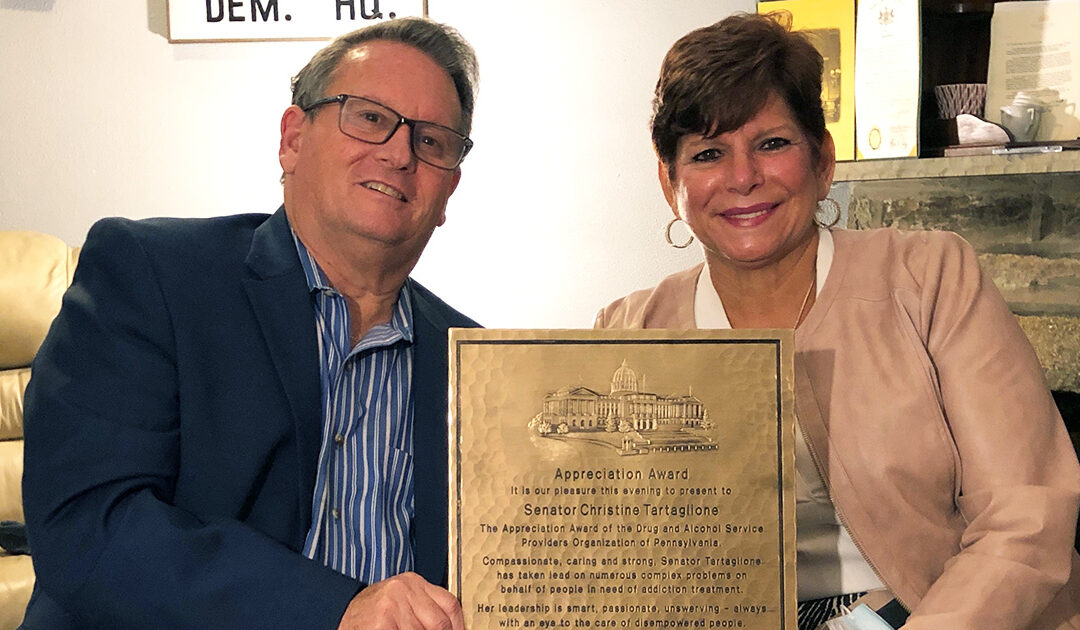
by Christin Brown | October 23, 2020 | News Releases
Philadelphia, PA – October 23, 2020 – The Drug & Alcohol Service Providers Organization of Pennsylvania (DASPOP) have named State Senator Christine Tartaglione as the recipient of its Appreciation Award during the organization’s annual Celebration of Recovery.
Senator Tartaglione also delivered a stirring keynote address during the event, which was held via video conferencing in compliance with COVID-19 mitigation guidelines. The Senator detailed publicly for the first time in her 25-year career her ongoing recovery from alcoholism.
“Discussing such personal matters in a public setting can be awkward or difficult, but it also brings me great comfort,” Senator Tartaglione said. “It’s like lifting a heavy weight off my shoulders. It’s a great relief knowing that I can be forthright about the challenges I face, and I don’t have to pretend like everything is fine even though I know there is a problem.”
The Senator said she has avoided drinking alcohol for the last 17 years. Robert Dellavella, the Chief Executive Officer of Self-Help Movement Inc. in Northeast Philadelphia, presented the award to the Senator during a small gathering of her close friends.
Congressmembers Brendan Boyle and Brian Fitzpatrick, State Senate Minority Leader Jay Costa, and Bucks County Commissioner Gene DiGirolamo were among the dignitaries to congratulate Senator Tartaglione during the online event. DASPOP Founder and President Deb Beck hosted the celebration.
Addressing the many assembled treatment advocates, Senator Tartaglione said, “Individuals and organizations like yours are doing God’s work and are saving human lives. You are healing people physically and spiritually.”
Of her personal story, the Senator added, “I sincerely hope that my message about vulnerability, honesty, and recovery resonates with the many, many people who, like me, struggle with alcohol or drugs. I hope my story will show others that there is a path forward in sobriety and that a fulfilling life awaits them on the other side.”
Senator Tartaglione has advocated strongly in the General Assembly for expanding treatment options, access, and insurance coverage for people who suffer with drug- and alcohol-related illnesses.
Also during the Celebration of Recovery, DASPOP presented Doug Tieman, CEO of Caron Treatment Centers, with its Lifetime Achievement Award. Mr. Tieman has announced his retirement after a long and distinguished career in the drug and alcohol treatment field.
# # #
If you would like more information about this topic, please contact William Kenny at 215-533-0440 or William.Kenny@pasenate.com.
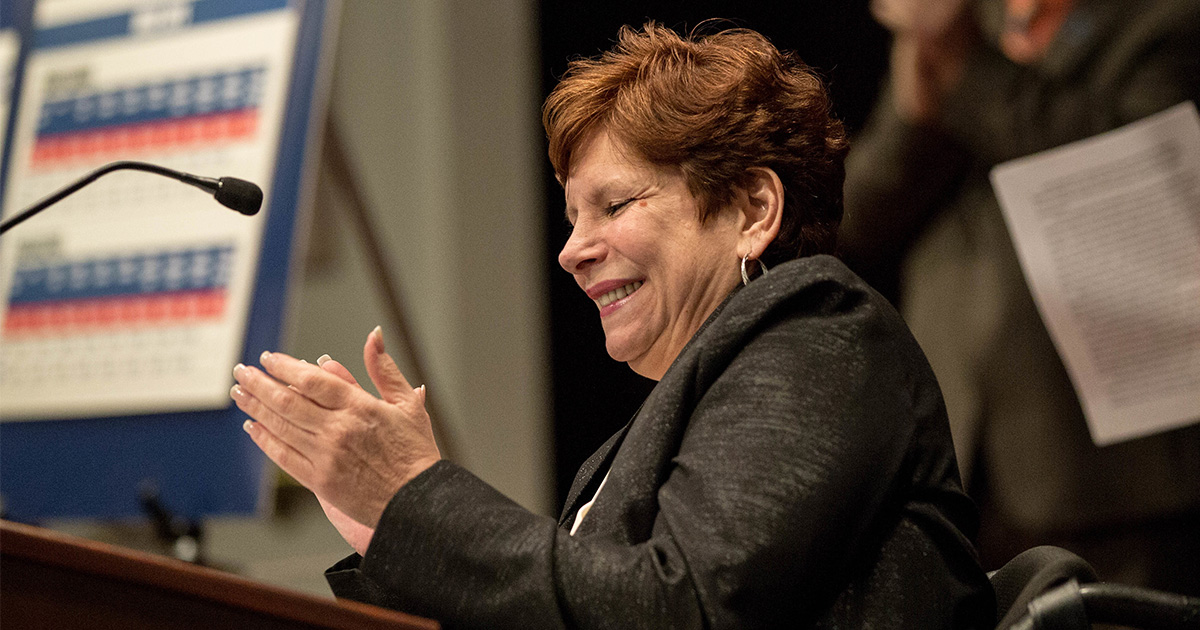
by Christin Brown | October 7, 2020 | News Releases
Governor Wolf’s new OT rules took effect on October 3, requiring employers to pay time-and-a-half to all workers who earn less than $45,500 a year and log more than 40 hours in a week.
Philadelphia, PA – October 7, 2020 – State Senator Christine Tartaglione applauded new overtime rules published in The Pennsylvania Bulletin on October 3 that require all Pennsylvania employers to pay time-and-a-half wages to employees who earn less than $45,500 a year and who log more than 40 hours in a workweek. The new base earnings threshold provides an additional 200,000 Pennsylvania workers with coverage under the state’s overtime pay requirements, regardless of their job titles.
“For far too long, Pennsylvania has allowed many of its worker protections to erode as inflation steadily diminishes the value of the dollar and as the income gap between the wealthy and working-class folks grows larger and larger,” Senator Tartaglione said. “For example, it has been more than 14 years since the General Assembly last raised Pennsylvania’s minimum wage. And prior to these new overtime regulations, it had been 40 years since the Commonwealth raised the income threshold for workers to qualify for mandatory overtime pay.”
Until this year, workers who were earning more than $23,660 in annual base pay could be excluded from mandatory overtime pay protection. That is, if an employer classified the worker as an executive, administrative, or professional salaried employee, the employer did not have to pay overtime wages when the employee logged more than the standard 40 hours in any given workweek.
As of January 1, 2020, the federal government enacted a higher earnings threshold of $35,568 ($684 per week). By default, Pennsylvania’s threshold also increased to that level.
Late last year, Governor Tom Wolf, through the Pennsylvania Department of Labor & Industry, proposed an additional increase in the threshold to $45,500 annually ($875 per week). Following a regulatory review process that included a public comment period, the Commonwealth’s Independent Regulatory Review Commission approved the final rulemaking earlier this year. The new regulations took effect on October 3.
“We know from extensive academic research and from the examples we see in many other states that investments in our workforce through policies like mandatory overtime pay and higher minimum wages benefit our communities and our economy,” Senator Tartaglione said. “Our workers are consumers too. When we put more money in their pockets and improve their quality of life, everyone stands to benefit.”
According to the Keystone Research Center, more than four decades ago, more than 60% of salaried workers in the United States received time-and-a-half pay automatically when they worked more than 40 hours in a week, because exemption from overtime pay protection was only intended to apply to high-level managers and professionals who were already being well-compensated without overtime pay.
Since 1980, the cumulative rate of inflation in the U.S. is 215.4%. Therefore, $23,660 in 1980 dollars equates to $74,632 in 2020 dollars.
# # #
If you would like more information about this topic, please contact William Kenny at 215-533-0440 or William.Kenny@pasenate.com.

by Christin Brown | October 7, 2020 | News Releases
To date 258 local business have received or will soon receive $4.5 million in grants through the Statewide Small Business Assistance program.
Philadelphia, PA – October 7, 2020 – State Senator Christine Tartaglione today announced that 258 small businesses in and around the 2nd Senate District have received or will soon receive a combined $4.5 million in COVID-19 relief funding through Statewide Small Business Assistance (SBA), a $225 million program created by the General Assembly in May through its comprehensive PA CARES legislation.
These local businesses spanning portions of North and Northeast Philadelphia are among about 900 citywide and more than 4,100 across the state that have received grants ranging from $5,000 to $50,000 or have completed a verification process that will enable them to obtain their approved funding imminently.
“Pennsylvania businesses and their employees have worked very hard and made many sacrifices that have enabled the Commonwealth to reduce the spread of COVID-19,” Senator Tartaglione said. “As they continue their difficult reopening process, it is crucial that we provide them with resources to catch up financially and to operate safely moving forward.”
In all, more than 10,000 Pennsylvania businesses have received preliminary approval for a combined $192 million in grants through two rounds of SBA funding. Businesses in all 67 Pennsylvania counties have been approved. In Philadelphia, about 1,200 businesses have received preliminary approval. Additional verifications will be announced as they occur.
As adopted by the General Assembly and implemented by the administration of Governor Tom Wolf, the SBA program prioritized applicant businesses owned by low- or moderate-income individuals; those owned by women or minorities; those in communities with relatively high poverty rates, low median incomes, high unemployment rates, and high population loss; those in designated revitalization areas; those in rural areas; and those operating in business sectors most-impacted by the pandemic.
The program is being administered through 17 nonprofit Community Development Financial Institutions (CDFIs) that have been certified by the Commonwealth and whose primary activity is providing financing options for small businesses.
As of October 4, $76.8 million in SBA grants had been distributed or received final approval for distribution statewide, while $16 million had been distributed or received final approval for distribution in Philadelphia.
For more information about the program and a listing of the verified grant recipients, visit https://pabusinessgrants.com/
# # #
If you would like more information about this topic, please contact William Kenny at 215-533-0440 or William.Kenny@pasenate.com.

by Christin Brown | September 15, 2020 | News Releases
Additional SBA grants will be distributed in the coming weeks as part of a $225 million COVID-19 relief program created by the Pennsylvania General Assembly in May.
Philadelphia, PA – September 15, 2020 – State Senator Christine Tartaglione today announced that 183 small businesses in and around the 2nd Senate District have received or will soon receive a combined $3,050,000 in COVID-19 relief funding from the Commonwealth as part of Pennsylvania Statewide Small Business Assistance, a $225 million program created in the comprehensive PA CARES legislation adopted by the General Assembly in May.
These local businesses are among 647 in Philadelphia and more than 3,000 statewide that have completed all required financial verifications and accepted the terms of the grant program in writing. In all, approximately 5,000 Pennsylvania businesses, including more than 1,100 in Philadelphia, have received preliminary approval for individual grants of up to $50,000. Additional verifications will be announced as they occur in the coming weeks.
“We are at a critical juncture for Pennsylvania’s small businesses and have been so since the very beginning of the COVID-19 emergency in March,” Senator Tartaglione said. “My General Assembly colleagues and I have been working very hard to provide resources to all those who have been negatively impacted by the pandemic, including small businesses and their employees. These funds will help them cover operating expenses, reopening costs, technical assistance, risk reduction training, and debt relief.”
The list of successful grant applicants includes many business types impacted most by the coronavirus, such as restaurants and taverns, hair salons and barber shops, childcare centers, and special events facilities, as well as more-specialized business types such as bridal shops, bakeries, chiropractors, gift stores, and commercial art studios.
The grant program is being administered through 17 nonprofit Community Development Financial Institutions (CDFIs) that have been certified by the Commonwealth and whose primary activity is providing financing options for small businesses. As of September 4, more than $55 million had been distributed or received final approval for distribution.
Two rounds of applications were conducted to provide interested businesses with multiple opportunities to apply for these limited funds. The final application window concluded on August 28. To be eligible, businesses must have been in operation prior to February 15, 2020, and had 25 or fewer full-time equivalent employees prior to that date; had annual revenue of no more than $1 million prior to the pandemic; and been generating at least 51% of their revenues in Pennsylvania. Priority was given to applicants with women ownership, those located in designated “Main Street” or “Elm Street” districts, those in rural communities, and those that are at least 51% owned and operated by persons who are Black, Hispanic, Native American, Asian American, or Pacific Islander. For more details about the program, visit www.pabusinessgrants.com.
# # #
If you would like more information about this topic, please contact William Kenny at 215-533-0440 or William.Kenny@pasenate.com.

by Christin Brown | September 9, 2020 | News Releases
Community colleges, state-related universities, and a technical school would be awarded a combined $130 million in CARES Act funding to cover COVID-related costs.
Philadelphia, PA – September 9, 2020 − The Pennsylvania Senate Appropriations Committee today advanced legislation sponsored by State Senator Christine Tartaglione and Senate Democratic Leader Jay Costa that would allocate $130 million in federal CARES Act funding to help higher education institutions in the Commonwealth manage financial hardships caused by the COVID-19 pandemic.
Senate Bill 1226 proposes to grant $35 million to Pennsylvania’s community colleges, $25 million each to Temple University, the University of Pittsburgh, and Penn State University, $10 million to Lincoln University, and $10 million to Thaddeus Stevens College of Technology. Previously, the Senate adopted legislation to allocate more than $72 million in federal CARES Act funding to PA State System of Higher Education universities and to the Pennsylvania Higher Education Assistance Agency.
The Appropriations Committee adopted SB1226 unanimously. The legislation will advance to the full Senate for consideration.
“Pennsylvania’s state-related institutions, community colleges, and technical schools have suffered great financial setbacks due to the pandemic,” Senator Tartaglione said. “Despite these challenges, our higher education community has responded to this crisis in numerous ways to assist students and the entire Commonwealth as we navigate this uncharted territory.”
“Shuttering campuses; transitioning to distance learning; refunding room, board, and activities fees; and the potential loss of enrollment have all caused financial hardship and uncertainty for these institutions. They have already received some federal funding, but more must be done to help sustain them through this difficult time.”
In keeping with federal requirements, all CARES Act funds will be used to cover costs incurred by the recipients due to the COVID-19 pandemic.
# # #
If you would like more information about this topic, please contact William Kenny at 215-533-0440 or William.Kenny@pasenate.com.
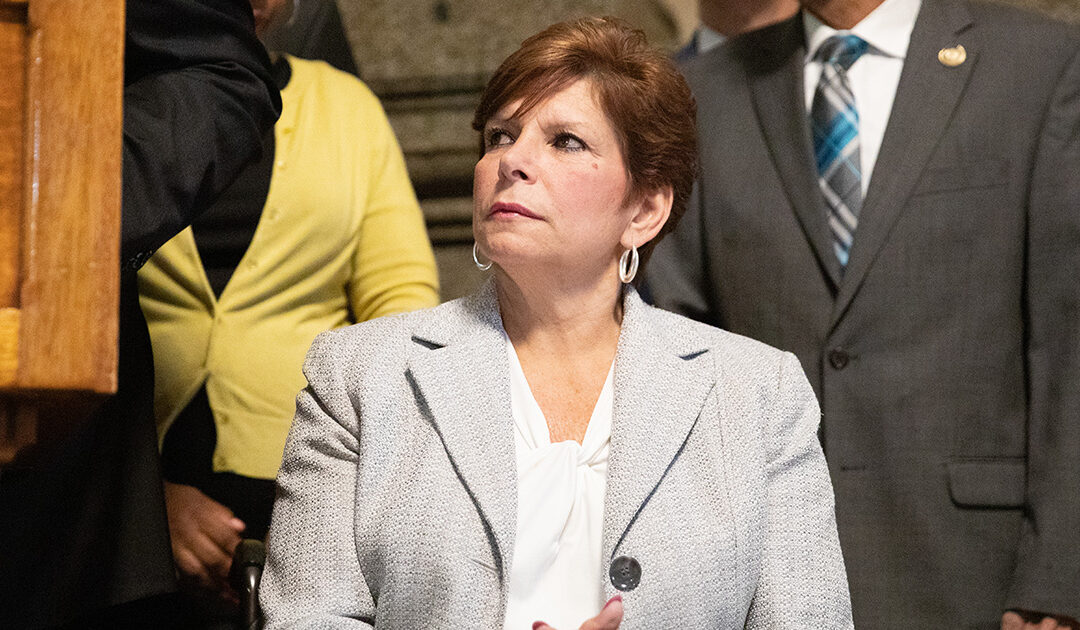
by Christin Brown | August 3, 2020 | News Releases
The legislators jointly authored a letter to U.S. House leadership calling for 100% federal reimbursement of unemployment insurance costs that nonprofits incur.
Philadelphia, PA – August 3, 2020 − Pennsylvania State Senator Christine M. Tartaglione (D-Philadelphia), Democratic Chair of the PA Senate Labor & Industry Committee, and Congressman Brendan F. Boyle (PA-02), member of the U.S. House Ways and Means Committee, sent a letter to U.S. House Leadership urging the inclusion of language that supports the nonprofit sector in the next coronavirus relief package.
The letter authored by Congressman Boyle and Senator Tartaglione requests that the next COVID-19 response package includes language providing 100% reimbursement by the federal government of the costs of unemployment benefits they incur.
“From a social services and employment standpoint, the viability of nonprofits is essential to the Commonwealth of Pennsylvania and to the nation,” Senator Tartaglione said. “These charitable organizations enable millions of Americans to bridge the gap between poverty and dignity, and they bolster the broader economy with critically needed jobs at a time of historic unemployment.”
“From food banks to health clinics, nonprofits in Philadelphia and across the nation have strengthened our communities by providing critical services throughout this pandemic,” said Congressman Boyle. “We must look to support our local partners and make it easier, not harder, for them to survive this challenging time. By providing 100% reimbursement, we will be investing in our local communities and ensuring much needed services do not terminate as we begin to see sharp spikes in the number of new cases.”
In Pennsylvania alone, the nonprofit sector employs 16% of the total workforce, which equates to more than 807,000 individuals. While most nonprofits are hoping to maintain their employees and services, many of these nonprofits are reaching their breaking point as the crisis continues to drain their limited resources. The proposal to grant nonprofits 100% reimbursement for the costs of unemployment benefits has received bipartisan support. A copy of the letter can be viewed here.
# # #
If you would like more information about this topic, please contact William Kenny at 215-533-0440 or William.Kenny@pasenate.com.
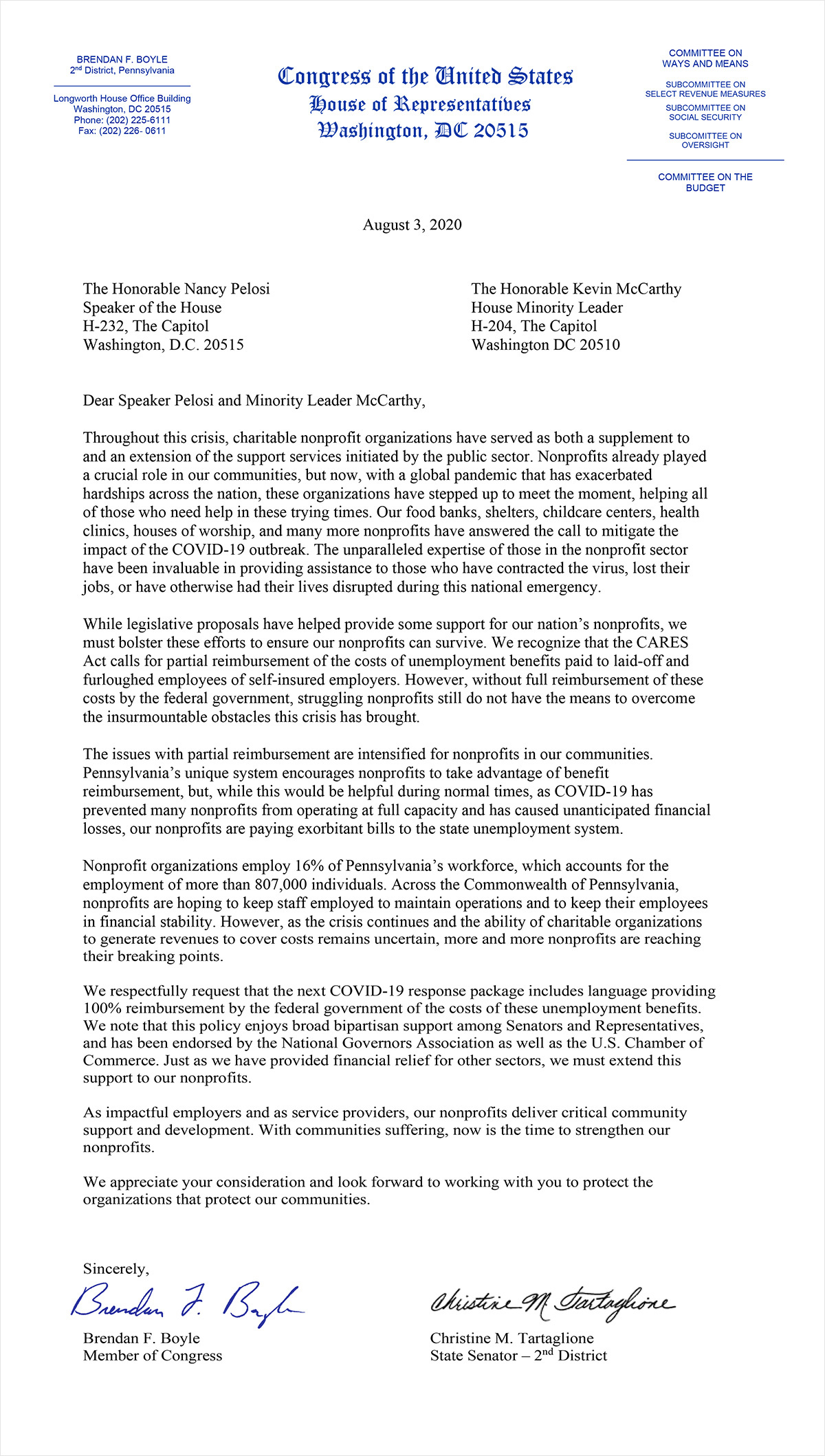

by Christin Brown | July 8, 2020 | News Releases
Unity Recovery was among 14 agencies statewide to receive a combined $2 million in Substance Abuse and Mental Health Services Administration grants.
Philadelphia, PA – July 8, 2020 – State Senator Christine Tartaglione announces that Unity Recovery of Philadelphia has been awarded almost $200,000 by the Pennsylvania Department of Drug and Alcohol Programs (DDAP) in the form of a Substance Abuse and Mental Health Services Administration (SAMHSA) grant.
The funding will allow Unity to create the Philadelphia Recovery Friendly Workplace initiative, a program that will advocate for the hiring and continued employment of people in opioid use disorder recovery while helping to foster a more-inclusive culture in Southeastern Pennsylvania workplaces. SAMHSA grants totaling $2 million were awarded to 14 organizations throughout Pennsylvania. The grant funds originated with $75 million in federal funding allocated to the Commonwealth last September to support statewide efforts to address the opioid crisis.
“I am very encouraged that the Wolf administration is providing agencies like Unity Recovery with the resources they need to make a real, local, and personal impact in the communities they serve,” Senator Tartaglione said. “The administration has been steadfast in its commitment to lessening the opioid crisis in Pennsylvania. These grants will continue and expand that vital work.”
“We have not lost focus on the continuing opioid crisis in Pennsylvania,” Governor Wolf said. “And now more than ever, employment services are vital to help people struggling during the pandemic with the loss of a job or need to find employment. These grants will help those with substance use disorder have a better chance at recovery by helping to access employment.”
Statewide, awardees will provide a wide variety of employment services including vocational assessments, resume writing, interviewing skills, job placement, and transportation assistance. Each agency has identified one local employer that has committed to hiring individuals in recovery from opioid use disorder.
Unity’s grant, valued at $198,772, will help it implement its Recovery Friendly Workplace model in Philadelphia. Unity has previously implemented this model successfully in New Hampshire, Nevada, and Wisconsin.
“I am committed to informing and referring constituents of the 2nd Senate District to the type of peer-based recovery and employment support services provided by Unity,” Senator Tartaglione said. “Not only do these types of support services help people maintain their recovery, they elevate their likelihood of gaining and maintaining employment and help them to develop positive connections within the larger community.”
# # #
If you would like more information about this topic, please contact William Kenny at 215-533-0440 or William.Kenny@pasenate.com.

by Christin Brown | June 8, 2020 | News Releases
HARRISBURG – June 8, 2020 – Members of the Pennsylvania Senate Democratic Caucus announced the direction of $225 million in federal CARES Act funding to aid small businesses across the commonwealth. This funding was authorized by the recently enacted COVID-19 Emergency Supplement to the General Appropriation Act of 2019 and was a centerpiece of the caucus’ PA CARES Plan.
The aid will be distributed as follows: $100 million is set to go to the Main Street Business Revitalization Program, $100 million to the Historically Disadvantaged Business Revitalization Program, and $25 million for loan payment deferment and loss reserves for loans impacted by COVID-19. The aid will be directed by the Department of Community and Economic Development to Community Development Financial Institutions (CDFI), which are intimately familiar with the needs of the most vulnerable small businesses in our communities.
“I want to thank Governor Wolf for engaging leadership in the General Assembly to inform the process of moving federal aid out to those who have been most harmed by the COVID-19 pandemic. I also want to thank the leadership of the Senate Democratic caucus who worked with our members to formulate a strategic plan for the deployment of nearly $4 billion in federal assistance,” said state Senator John Blake (D-Lackawanna). “The Main Street Business Revitalization program is a reflection of that cooperation and leadership and it will meet Pennsylvania’s small business owners where they are, on Main Street, after nearly three months of lost or no sales. It will enable small business owners throughout the commonwealth to meet their insurance payments, rents, health insurance premiums, local taxes and other expenses that they otherwise could not meet due to lost sales. Finally, I want to thank the 17 CDFIs throughout the state as well as DCED for their professionalism, agility, urgency and dedication to getting this federal funding to the small businesses who need it most as quickly as possible.”
Eligible businesses will apply through one of the CDFI Network partners and will have to have been operating on or before February 15, 2020, and must have paid taxes to state and federal governments. Qualifying main street and historically disadvantaged small businesses must have 25 or fewer employees and experienced losses as a result of Gov. Tom Wolf’s March 19 stay-at-home order. Organizations seeking grants from the historically disadvantaged small businesses program must also be 51 percent owned and managed by socially and economically disadvantaged individuals.
“The announcement of the Main Street and Historically Disadvantaged Business Revitalization Programs will provide welcomed relief for mom and pop businesses in neighborhoods across the commonwealth,” said State Senator Vincent Hughes (D-Philadelphia/Montgomery). “Since this pandemic began, we have heard the needs of the auto body shops, the barbershops, the beauticians, the pizza shop owners, the soul food establishments and other businesses in our communities. The needs of these businesses that were unable to get much needed help from other state and federal programs were a priority in our Senate Democratic Caucus’ April 29 PA CARES Program announcement. For months, my office has worked with a network of trusted community organizations that have a proven track record of working with our small CDFIs to find a solution to assist our neighborhood businesses. I believe these programs are that solution. There is still more work to be done, but these programs are a win for Pennsylvania and its small businesses.”
Businesses will be eligible for up to $50,000 in grants. Grants can be used to cover operating expenses during the shutdown and in the transition period to reopening, technical assistance and training, debt payment relief for CDFI borrowers and loan loss reserves.
“Our small businesses all across the state made sacrifices so that we could flatten the curve of COVID-19 and save lives,” said Senate Democratic Leader Jay Costa, Jr. “Now as we begin to recover, our businesses will need and deserve assistance to reopen their doors, rehire their staff and serve our communities again. We thank them for their patience through this difficult time, and are ready to offer the programs, loans and assistance they need.”
Businesses will be required to submit proposals for review documenting sales losses, projected revenues, the duration of closure as a result of COVID-19, and relief receipts for other federal, state and local government aid. Eligible businesses will apply directly through a local CDFI.
“One of the goals of the pandemic-recovery stimulus plan that I offered in March, was to jump-start business operations and speed the economic recovery by making resources readily available to get more men and women back to work quicker,” Brewster said. “Using federal CARE dollars to bolster business and smooth the back-to-work transition is critically important. The caucus CARES initiative includes one piece of the plan and will be especially useful to small businesses as they cover expenses and manage start-up costs. Plus, it will usher in help for small businesses who may not have been able to access other state or federal business assistance programs.”
Distributed funds will be monitored by DCED to track the total number of grants awarded under these programs including county, the number of jobs saved by the grants, the total amount of loan payment and deferment, administrative costs and more.
“Thank you to Governor Wolf and his administration for recognizing the need for our Main Street Business Revitalization Program and incorporating that proposal into the Commonwealth’s plan to support our small businesses, which represent nearly half of the private sector workforce in Pennsylvania – 2.5 million jobs,” said Senator Iovino (D-Allegheny/Washington). “Small businesses are the job creators in our communities, the revenue generators for our Commonwealth, and the cornerstone of vibrant main streets. As small business owners are struggling to hang on, this $225 million grant package is exactly the kind of lifeline that these economic drivers need to support our recovery.”
For more about the caucus’ comprehensive, people-focused COVID-19 recovery plan, visit pasenate.com/pacares.

by Christin Brown | June 5, 2020 | News Releases
Letter signed by 17 Senators Calls for Immediate Hearings
Harrisburg, June 5, 2020 − Senator John Sabatina (D-Philadelphia) implored Governor Wolf to suspend the termination of 700 Pennsylvania employees until public hearings can be held on the clandestine decision by the Pennsylvania Turnpike Commission (PTC).
“It is absurd that we would send 700 more Pennsylvanians to the unemployment line during this crisis,” Sabatina said, who serves as the Democratic Chair of the Senate Transportation Committee. “We agreed these loyal state employees would be retained until the end of 2021, when the Turnpike would go cashless.”
Sabatina wasn’t alone in his dismay. Senator Tartaglione, Democratic Chair of the Labor Committee, also questioned the decision.
“This sudden decision to terminate 700 hardworking Turnpike employees violates the agreement we had in place and comes at a time when the Commonwealth should be doing everything it can to curtail the loss of jobs,” said Senator Tartaglione, the Democratic Chair of the Senate Labor and Industry Committee. “We must insist that all stakeholders have their say in a public forum as part of any decision-making process of this magnitude.”
In all, 17 Senators are calling for the hearings before the June 18th termination date. The letter was sent to Governor Wolf on Friday.
You can read Senator Sabatina’s letter here:
The Honorable Governor Tom Wolf
Office of the Governor
508 Main Capitol Building
Harrisburg, PA 17120
June 5, 2020
Re: Suspend Elimination of Toll Collector Positions
Dear Governor Wolf:
We are deeply disturbed at the stealthy manner in which the Pennsylvania Turnpike Commission voted to eliminate over 700 toll collector jobs this week.
Prior to Tuesday June 2nd, all parties understood that under the original agreement, the PTC promised to employ these Pennsylvanians until the exits went completely cashless at the end of 2021. During this timeframe, the remaining toll collectors would be able to apply for existing positions within the Commission, help get placed in appropriate Commonwealth vacancies, or receive a tuition credit to help receive new job training. To our knowledge, none of the above terms of the agreement have been met.
Also prior to June 2nd, we believed that we had an open and transparent relationship with the PTC. On May 12, 2020, during a Senate Transportation Committee Hearing regarding Turnpike finances, the opportunity presented itself for the PTC to discuss potential layoffs. Despite questions raised by Senate members on the future of the toll workers, no meaningful discussion on this topic was advanced by any member of the PTC.
We, therefore, believe that it is necessary to conduct an informational hearing to determine the fundamental reasons behind the PTC’s failure to abide by the original agreement regarding termination as well as its failure to notify, inform and discuss this matter with the Legislature. We understand the financial difficulties placed upon the Turnpike, however, it is blatantly unconscionable to mislead employees into thinking that their jobs were somewhat secure for the next year and a half, while knowing that these loyal employees really had less than a month to find another job in the midst of a pandemic.
These people have families that depend on them to provide necessities during this extremely difficult time and adding 700 Pennsylvanians to the unemployment rolls will not benefit the Commonwealth.
We respectfully request that this decision to layoff 700 toll collectors on June 18, 2021 be suspended until it can be established with certainty through an informational hearing that there is not some reasonable alternative that allows the PTC to keep its original promise to its faithful employees.
Thank you for your immediate attention to this matter and we await your prompt response.
Sincerely,
Senator John P. Sabatina, Jr. Chairman, Transportation Committee
Senator Jay Costa 43rd Senatorial District
Senator Anthony Williams 8th Senatorial District
Senator Tina Tartaglione 2nd Senatorial District
Senator John Blake 22nd Senatorial District
Senator Vincent Hughes 7th Senatorial District
Senator Judy Schwank 11th Senatorial District
Senator Lisa Boscola 18th Senatorial District
Senator James Brewster 45th Senatorial District
Senator Wayne Fontana 42nd Senatorial District
Senator Timothy Kearney 26th Senatorial District
Senator Andrew Dinniman 19th Senatorial District
Senator Lindsey Williams 38th Senatorial District
Senator Maria Collett 12th Senatorial District
Senator Pam Iovino 37th Senatorial District
Senator Katie Muth 44th Senatorial District
Senator Larry Farnese 1st Senatorial District

by Christin Brown | June 1, 2020 | News Releases, oped
On Monday, the Philadelphia Inquirer published the following opinion article by Senator Tartaglione in which she called for the immediate adoption of her Senate Bill 464 to strengthen workplace health and safety protections for state, county, and municipal employees, providing them with the same protections that all federal and private-sector employees already receive.
Pa. Capitol COVID disclosure issue underscores much-needed workplace protections for all | Opinion
By Christine Tartaglione
Amid a pandemic, the sharing of timely information is key to stopping the spread of illness.
That is why I was shocked to learn only through news media reports more than a week after the fact that a member of the Pennsylvania House of Representatives had tested positive for COVID-19. And I was appalled that the partisan leadership of the House chose not to notify, in a timely fashion, the member’s colleagues from opposing parties, his counterparts in the Senate, or the state employees whose jobs require them to be in the halls and offices of the Capitol during a pandemic.
Prompt and comprehensive notification could have and should have been conducted, but it was not. In light of these events, I renew my call for the General Assembly to immediately advance my legislation, Senate Bill 464, which would, for the first time, provide all public employees on the state and local levels with the same workplace health and safety protections enjoyed by all the nation’s federal and private-sector employees.
In his public statement Wednesday, the House member reported that he last visited the Capitol on May 14, was tested on May 18 after developing typical COVID-19 symptoms, and was confirmed positive on May 20.
The Centers for Disease Control and Prevention tells us that the incubation period for COVID-19 is 14 days. Therefore, by the time this member and his caucus notified the rest of us of a potential exposure, the virus could have been spread through the chain of social contacts to literally hundreds of individuals.
In subsequent public statements, the member’s caucus has reportedly cited health-care privacy laws for the decision to withhold this critical and potentially lifesaving information from people who were and are directly affected by it. However, the restrictions codified in the Health Insurance Portability and Accountability Act (HIPAA) apply only to health insurers, health-care clearinghouses, and health-care providers. They do not apply to employers.
The member personally stated that he kept quiet about his diagnosis “out of respect for my family, and those who I may have exposed.” Yet, I am quite certain that the people who he may have exposed would have very much appreciated a heads up about it.
More than that, being informed promptly about workplace health hazards should be their right.
Among many other provisions, SB 464 would require state and local public employers, including school districts, to “provide reasonable and adequate protection to the lives, safety or health of the employees.” Employers would have to notify employees of the confirmed presence of health hazards like COVID-19 in the workplace.
Further, the legislation would create the Pennsylvania Occupational Safety and Health Review Board to oversee and enforce its workplace health and safety requirements, including worker notification of the hazards that threaten them. Private and federal employers already furnish their employees with these protections.
As the spread of COVID-19 in Pennsylvania slows and businesses begin to reopen throughout the commonwealth, employers must keep workers informed about the risks that they face. If employers choose not to do that, then the law should mandate that they do so. Senate Bill 464 should receive consideration immediately — as should all employees.

by Christin Brown | April 23, 2020 | News Releases
The Continuing of Education Equity Grants may be used to purchase computer equipment, such as laptops, tablets and internet hotspots, as well as paper lessons and coursework.
Philadelphia, PA – State Senator Christine Tartaglione (D-Philadelphia) announces that the Pennsylvania Department of Education has awarded $128,450 in grants to schools within the 2nd Senate District as well as $500,000 directly to the School District of Philadelphia for the purchase of computers and other instructional materials.
Continuing of Education Equity Grants (CEEG) are designed to help provide access and inclusion for all learners by bridging the gap for students who are limited in their ability to participate in continuity of education. The new awards are applicable for the current 2019-2020 academic year.
“I applaud the Department of Education and the Wolf Administration for recognizing the urgent need among our schools for these resources in light of the COVID-19 disaster emergency,” Senator Tartaglione said. “Brick-and-mortar schools are closed to mitigate the public health threat of the coronavirus, but student learning must continue. We owe it to our children to provide them with the resources they need to learn and prepare for their future.”
The School District of Philadelphia was awarded $500,000. Additional grant recipients in the 2nd Senate District included Mastery Charter-Smedley Campus ($36,500), John B. Stetson Charter ($43,950), Antonia Pantoja Community Charter ($40,000), and Northwood Academy Charter ($8,000).
CEEG funding may be used to purchase computer equipment, such as laptops, tablets, and internet hot spots, as well as other instructional materials including paper lessons and coursework. Schools with the highest percentages of students lacking access to resources were given priority in receiving these grants.
For additional information about the grant program and COVID-19 resources for schools, visit the Department of Education website at education.pa.gov.
# # #
If you would like more information about this topic, please contact William Kenny at 215-533-0440 or William.Kenny@pasenate.com.

by Christin Brown | April 15, 2020 | News Releases
Philadelphia, PA, April 15, 2020 – State Senator Christine Tartaglione (D-Philadelphia) today applauded Pennsylvania Department of Health Secretary Rachael Levine and Governor Tom Wolf for issuing an executive order implementing the senator’s legislation that bolsters COVID-19 protections for employees of businesses that are authorized to continue in-person operations during the statewide disaster emergency.
Among many new mandates, the order establishes requirements for social distancing, for the provision and use of facemasks in the workplace, for the reduction of large gatherings, for limited visitor access to workplaces, and for sufficient staffing levels. In addition, all components of the order must be communicated to employees in their primary language, thereby ensuring that all workers can understand the new requirements.
All of these elements and many others had been proposed by Senator Tartaglione in two Senate bills: the COVID-19 Food Worker Safety Act (SB 1101) and the COVID-19 Grocery Store Safety Act (SB 1102). Earlier today, the Senate’s Rules & Executive Nominations Committee refused to adopt the language from Senator Tartaglione’s bills as part of an omnibus amendment to a Republican-sponsored bill focused on the reopening of non-essential businesses in the Commonwealth amid the pandemic.
In a party-line vote, the Senate adopted the Republican bill without Senator Tartaglione’s comprehensive worker protections. At Tartaglione’s urging, Secretary Levine and Governor Wolf implemented those protections through the executive order.
“It is vital that we require businesses to practice these common-sense and scientifically proven safety protocols for the protection of workers and the public at-large. And that is what this order does,” said Senator Tartaglione, who is Democratic chairwoman of the Senate Labor & Industry Committee. “Many of the measures included in this order were part of legislation that I proposed. I applaud this swift action by Secretary Levine and Governor Wolf to implement these much-needed protocols.”
Specifically, the order establishes protocols to help employees maintain social distance during work. Employers that are authorized to continue in-person operations are required to:
- Provide masks for employees to wear during their time at the business, and make it a mandatory requirement while at the work site, except to the extent an employee is using break time to eat or drink, in accordance with the guidance from the Department of Health and the CDC. Employers may approve masks obtained or made by employees in accordance with this guidance;
- Stagger work start and stop times for employees when practical to prevent gatherings of large groups entering or leaving the premises at the same time;
- Provide sufficient space for employees to have breaks and meals while maintaining a social distance of 6 feet, including limiting the number of employees in common areas and setting up seating to have employees facing forward and not across from each other;
- Conduct meetings and training virtually. If a meeting must be held in person, limit the meeting to the fewest number of employees possible, not to exceed 10 employees at one time and maintain a social distance of 6 feet.
- Ensure that the facility has a sufficient number of employees to perform all measures listed effectively and in a manner that ensures the safety of the public and employees;
- Ensure that the facility has a sufficient number of personnel to control access, maintain order, and enforce social distancing of at least 6 feet;
- Prohibit non-essential visitors from entering the premises of the business; and
- Ensure that all employees who do not speak English as their first language are aware of procedures by communicating the procedures, either orally or in writing, in their native or preferred language.
Upon discovery of an exposure to a person who is a probable or confirmed case of COVID-19, businesses are also ordered to implement temperature screenings before employees enter the business prior to the start of work and send any employee home who has an elevated temperature of 100.4 degrees Fahrenheit or higher. Sick employees should follow CDC-recommended steps. Employees should not return to work until the CDC criteria to discontinue home isolation are met, in consultation with the health care providers and state and local health departments. Employers are encouraged to implement liberal paid time off for employees who are on home isolation.
Upon an exposure, businesses are also ordered to do the following:
- Close off and ventilate areas visited by that individual;
- Wait a minimum of 24 hours, or as long as practical, before beginning cleaning and disinfection;
- Clean and disinfect all spaces, especially commonly used rooms and shared electronic equipment;
- Identify and notify employees who were in close contact with that individual (within about 6 feet for about 10 minutes); and
- Ensure that the business has a sufficient number of employees to perform these protocols effectively and immediately.
In addition to the social distancing, mitigation and cleaning protocols, businesses that serve the public within a building or defined area are ordered to implement the following, based on the size of the building and number of employees:
- Require all customers to wear masks while on premises, and deny entry to individuals not wearing masks, unless the business is providing medication, medical supplies, or food, in which case the business must provide alternative methods of pick-up or delivery of goods, except individuals who cannot wear a mask due to a medical condition (including children the age of 2 years) may enter the premises without having to provide medical documentation;
- Conduct business with the public by appointment only and, to the extent that this is not feasible, limit occupancy to no greater than 50 percent of the number stated on their certificate of occupancy as necessary to reduce crowding in the business and at check-out and counter lines in order to maintain a social distance of 6 feet, and place signage throughout each site to mandate social distancing for both customers and employees;
- Alter hours of business so that the business has sufficient time to clean or to restock or both;
- Install shields or other barriers at registers and check-out areas to physically separate cashiers and customers or take other measures to ensure social distancing of customers from check-out personnel, or close lines to maintain a social distance between of 6 feet between lines;
- Encourage use of online ordering by providing delivery or outside pick-up;
- Designate a specific time for high-risk and elderly persons to use the business at least once every week if there is a continuing in-person customer-facing component;
- In businesses with multiple check-out lines, only use every other register, or fewer. After every hour, rotate customers and employees to the previously closed registers. Clean the previously open registers and the surrounding area, including credit card machines, following each rotation;
- Schedule handwashing breaks for employees at least every hour; and
- Where carts and handbaskets are available, assign an employee to wipe down carts and handbaskets before they become available to a new customer.
Failure to comply with these requirements will result in enforcement action that could include citations, fines, or license suspensions. Compliance with the order will be enforced beginning Sunday, April 19 at 8:00 PM.
The governor has directed the following state agencies and local officials to enforce orders related to the COVID-19 pandemic to the full extent of the law:
- Pennsylvania Liquor Control Board
- Department of Health
- Department of Agriculture
- Department of Labor and Industry
- Pennsylvania State Police
- Local officials, using their resources to enforce closure orders within their jurisdictions
This order follows another order by Dr. Levine providing direction for maintaining and cleaning buildings for businesses authorized to maintain in-person operations under her and Governor Tom Wolf’s life-sustaining business orders announced March 19.
Governor Tom Wolf also recommends that Pennsylvanians wear a mask any time they leave their homes for life-sustaining reasons.
# # #
If you would like more information about this topic, please contact William Kenny at 215-533-0440 or William.Kenny@pasenate.com.
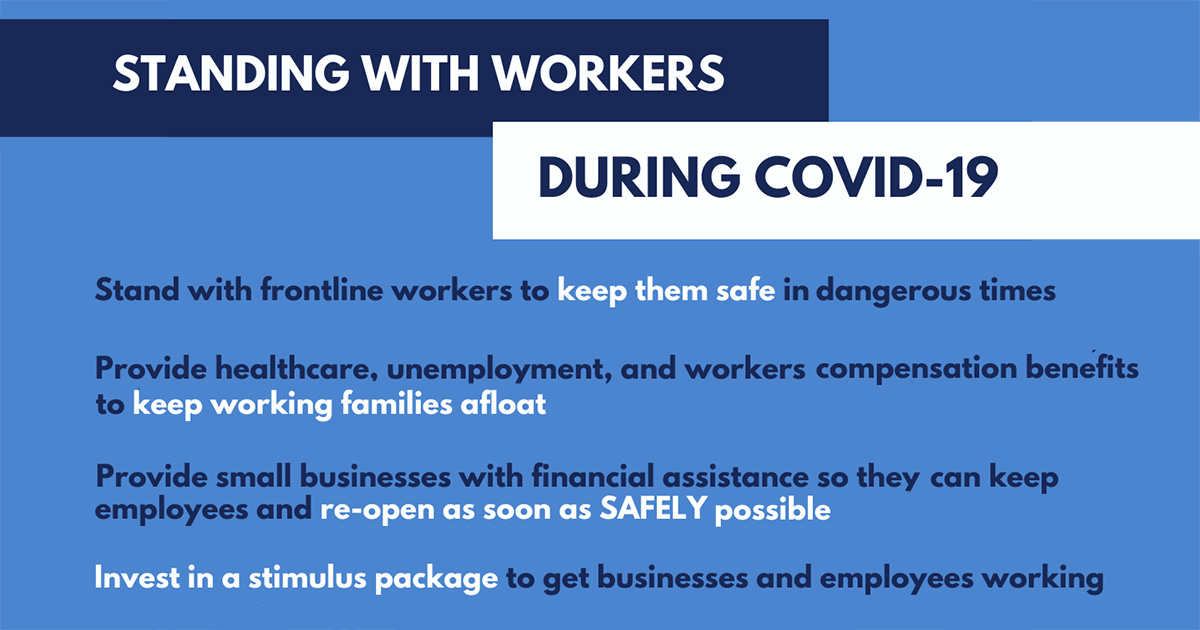
by Christin Brown | April 8, 2020 | News Releases
Harrisburg, PA − April 8, 2020 − The Senate adjourned Tuesday afternoon after the House Republicans indicated they would not be taking up Senate Bill 841, legislation that would have enabled local municipalities to hold their meetings remotely, permitted e-notary use; lengthened the time period a property tax payer can receive an early payment discount and delay penalties for late payments to Dec. 31st; and allowed businesses to make delayed payments on EITC. Another important amendment offered by Senator Pam Iovino (D-Allegheny) allowed school districts to renegotiate contracts to ensure contracted school workers can get paid and continue to receive benefits.
The amended SB 841 passed the Senate with bipartisan support. While the Senate Democrats and Republicans chose to put partisan difference aside, the House Republicans were pushing to please special interests and big donors. Intending to use this crisis as leverage, Speaker Turzai and his caucus passed legislation to prematurely allow businesses to reopen during this public health crisis and create a partisan task force to interfere with the Governor’s disaster response, both of which unnecessarily risk lives and threaten to expend the emergency.
“While the Governor and Department of Health Secretary offer leadership on public safety in daily briefings and Democratic members of the PA House and Senate draft legislation to protect working people who are either out of work or employed on the front lines of essential businesses, Republicans are putting lives at risk and undermining the Governor and Secretary Levine’s best efforts to end this crisis,” said Senate Democratic Leader Jay Costa, Jr. “Instead of taking the advice of our Health Secretary, they are trying to slow down our response and hasten the re-opening of non-essential businesses against the guidance of every public health entity in the country.”
The House Republicans were seeking even more egregious measures to provide civil immunity to big businesses, upend school districts ability to pay their teachers, and leave our corrections department employees at serious threat of the Coronavirus. Perhaps worst of all, the language does nothing to protect frontline workers, provide assistance to those that are out of work, or to help small businesses weather this crisis.
In an amendment to Senate Bill 327, House Republicans designed a task force with partisan appointees to usurp the Governor’s ability to rapidly respond to this quickly-evolving crisis. Their bill would require the Secretary of Health to leave PEMA, take hours away from public health crisis planning and defend her work in front of a redundant, political body.
The Senate Democratic Caucus will not support these bills. Alternatively, this caucus will be supporting legislation on the following issues:
- The American Working Family Relief Action Plan for front-line worker protections (Collett/L. Williams)
- Protecting workers during public health emergencies (Santarsiero)
- COVID-19 Food Worker Safety Act (Tartaglione)
- COVID-19 Grocery Store Worker Safety Act (Tartaglione)
- Payment of contract services in schools (Iovino)
- Childcare assistance (Schwank/L. Williams)
- Emergency expansion of the Family Medical Leave Act to provide paid sick leave (Farnese)
- Crisis grants for volunteer fire and EMS companies due to COVID-19 (Brewster)
- Require business interruption insurance to cover COVID-19 related business closures (Hughes)
- Eviction protection for all disaster emergencies (Farnese)
- Coronavirus disease and schools: allowing for online instruction (Dinniman)
- Creating a Common Wealth Fund to collect donations from individuals to provide for essential needs of those in need (AH Williams)
- Providing a presumption of eligibility for Workers’ Compensation benefits for workers that get sick in the workplace (Tartaglione)
- Ensuring receipt of a stimulus check from the Federal government is not included in an individual’s income for purposes of qualifying for social safety nets (Schwank)
- Exempting stimulus checks from the Federal government from State and local taxation (Brewster)
- Collaborating with financial institutions to mandate mortgage loan forgiveness, assistance to homeowners that were laid off due to state emergencies (Farnese)
“While many working Pennsylvanians are suffering from the COVID-19 pandemic, facing lost hours or even complete unemployment, others who find themselves in more fortunate circumstances have expressed a desire to help their fellow citizens by either donating to a local charity or patronizing local businesses,” said Senator Anthony H. Williams. “By establishing the “Pennsylvania Common Wealth” restricted account, taxpayers could redirect all or a portion of their stimulus check to the state, which in turn would be authorized to direct those funds into programs which help the neediest Pennsylvanians – property tax & rent rebates, temporary assistance for needy families, CHIP or medical assistance.”
“Pennsylvania needs solutions that help protect its working people who have been hit the hardest by the fallout of the coronavirus pandemic,” Senator Vincent Hughes said. “We in the Pennsylvania Senate Democratic Caucus have put forth a number of policy proposals that would do just that, meanwhile House Republicans have chosen to ignore these needs and push an agenda that jeopardizes public health and puts additional pressure on working people by delaying immediate relief. Our mission should be helping people in this unprecedented time of need and we will remain vigilant in protecting hardworking folks across the commonwealth.”
“As public servants, our most important duty is to protect the health, safety and welfare of our citizens. This includes making difficult decisions in challenging times. We all want businesses to reopen, employees back on the job, students back in classrooms and some semblance of normal life to resume, but that cannot happen unless we first continue mitigation efforts and follow the advice of our scientists and experts,” said Senator Wayne D. Fontana. “Anything contrary can set back progress and cause further harm on our economy and most importantly, on human health. The bipartisan legislation the Senate approved provides some necessary guidance and relief to local governments, businesses, school employees and property taxpayers during this unprecedented situation. It is unconscionable that House Republicans blatantly disregarded that duty and have chosen not to act.”
“The spread of coronavirus has not quieted the voice of special interests in Harrisburg and that’s tragic,” said Senator Larry Farnese. “Mitigation through isolation is working and we have to recognize that sacrifice through legislation that actually helps front-line workers instead of just saying nice things on social media.”
“This crisis and the Commonwealth’s response to the COVID-19 pandemic requires leadership, transparency and cooperation – not partisan politics,” said Senator John Blake. “While we’ve worked well with the Senate majority on real solutions that actually help people in this crisis, the House majority looks to undermine the executive authority of the Governor as well as the advice of medical and scientific experts regarding public health. I applaud the work being done by Governor Wolf and his administration to keep Pennsylvanians safe and to mitigate the spread of COVID-19. I will continue to support important legislation to help our business community, front-line workers and medical professionals; and to protect our citizens, schools and local governments across this state. We need to remain vigilant in following the recommendations of the PA Department of Health and the federal CDC.”
“Issues that the Commonwealth was already facing have been exacerbated by this pandemic, and child care services and early learning programs are near the top of the list. Childcare centers are teetering on the brink of insolvency, which is why part of our legislative package addresses early childhood learning and safe, quality childcare. We will not be able to restart Pennsylvania’s economy without this key component,” Senator Judy Schwank said. “Additionally, it’s vital that the income requirements of state programs like PACENET and Property Tax and Rent Rebate are adjusted so that Pennsylvanians receiving federal aid are not penalized later.”
“The key to an effective response to the pandemic is to ensure that our citizens are protected, health risks are addressed, and our economy restarts quickly,” Senator Jim Brewster said. “That’s why I introduced a six-point stimulus plan that will help small business, protect workers and create jobs once we are clear the threat posed by the pandemic. In addition, we need to make sure to address the immediate and long-term needs of first responders and all workers and businesses who are providing essential services during this time of extraordinary stress.”
“There is no segment of our Commonwealth that hasn’t been upended by this crisis. Everything is a priority. But in order to save livelihoods, we must first save lives,” said Senator Maria Collett. “As a nurse, I know firsthand the challenges our health care workers are up against and the urgency of passing legislation like the American Working Family Relief Action Plan for Front-Line Workers. Our doctors, nurses, first responders, senior care aides and others should not have to worry about getting sick or infecting others while performing their essential work.”
“It is irresponsible for the state to reopen businesses at the height of the COVID-19 outbreak. Those who are not essential workers should remain home,” said Senator Art Haywood. “We need to do all we can as legislators to support essential employees risking their lives on a daily basis,” said Senator Haywood (D-Montgomery/Philadelphia). “I will continue to support the work Governor Wolf and Secretary Levine have done to inform the public to remain safe and stay home.”
“The citizens of Pennsylvania are counting on their elected representatives to save lives by responding swiftly, pragmatically, and in a bipartisan manner to slow the spread of this highly contagious virus,” said Senator Pam Iovino. “To fulfill our duty to the public, we must follow the consensus guidance of public health professionals, focus on protecting front-line essential workers, and put in place protections that allow furloughed or unemployed workers and small businesses to weather the economic disruption.”
“As the Democratic chair of the Local Government Committee, I worked with stakeholders for weeks to craft the provisions of SB 841, I am disappointed these commonsense measures, which passed the Senate with bipartisan support, are being held up by House Republicans for little reason,” said Senator Tim Kearney. “The House should immediately pass SB 841 and focus on bringing relief to Pennsylvanians, rather than sabotaging the Governor’s efforts to keep our families safe.”
“Yesterday, the majority party in both chambers failed to use their legislative power, where they can literally pass any bill they want to, and instead decided to pack up and go home without,” said Senator Katie Muth. “Failing to pass meaningful bills when people are fighting for their lives is simply negligent.”
“Now is not the time to play politics,” said Senator Steve Santarsiero. “Saving lives has to be the first priority. In order to do that, we must all do our part and follow the Governor’s and Department of Health’s plans as they’ve been explained to us countless times. SB 841 is just one of many ways our caucus has worked in a bipartisan effort to provide relief to those who need it most. However, SB 327 is exactly what our healthcare professionals warn us against. Promoting a premature return to normalcy will only undermine our effort to keep the public safe, and further endanger thousands of lives.”
“Government’s most important role is the protection of its people. Since the COVID-19 crisis the Senate has met three times, with little to show for it. Communities across the commonwealth have no interest in the paralysis of government especially in the most desperate of times. What they do care about is the protection of our essential workforce, the interruption of our small businesses, job loss, staying in their homes and educating their children. The only thing that matters is the preservation and protection of every resource needed to keep families safe during this health crisis,” said Senator Sharif Street.
“We need to be back in Harrisburg, we need to get back to work. We must work together to ensure our communities are protected during uncertain times.”
“As thousands of Pennsylvanians continue to get sick and hundreds die, now is no time to play partisan politics,” Senator Tina Tartaglione said. “As public leaders, we must unite behind the common goal of reducing the threat of this virus and mitigating the harm being done to our constituents. The package of bills we have proposed will directly help all Pennsylvania families, including essential workers, displaced workers, first responders, school children, those who have become sick, and those in need. I urge all legislators from all political parties to support these bills.”
“Stopping the spread of COVID-19 and saving lives is our top priority. We also need to protect and support our constituents, our communities, and our businesses,” said Senator Lindsey Williams. “Our front-line essential workers – our hospital workers, grocery store workers, emergency service personnel and others – cannot afford to wait for PPE. They needed it weeks ago. Our childcare facilities need our help to stay open and provide care to the children of our essential workers while they risk their lives for us. Our small businesses need financial support to stay afloat. Our municipalities need the ability to meet remotely and make decisions that will ensure the safety of all of residents. There are a lot of needs right now and our constituents do not have time for us to waste playing partisan games or naming bridges. The Senate Democrats have offered concrete solutions that will help people. We should all be working together to get them to the Governor’s desk for signature as soon as possible.”
More information on the work of the Pennsylvania Senate Democratic Caucus during the COVID-19 crisis can be found at pasenate.com/covid19.
###

by Christin Brown | March 26, 2020 | News Releases
Philadelphia, PA, March 26, 2020 – State Senator Christine Tartaglione (D-Philadelphia) advises Pennsylvanians who are seeking to maintain or enter outpatient drug and alcohol recovery programs during the COVID-19 emergency that help is available to them through online and telephone-based counseling services and meetings.
“At this difficult time for all Pennsylvanians, it is imperative that we as a community redouble our efforts to support those among us who struggle with substance use disorder and those in recovery,” Senator Tartaglione said. “I am pleased to report that the Commonwealth’s Department of Drug and Alcohol Programs, as well as many private-sector programs are acting to mitigate the new challenges created by the coronavirus pandemic.”
While Pennsylvania remains under the disaster emergency declared by Governor Tom Wolf on March 6, all designated Single County Authorities that have received grant funding from the Department of Drug and Alcohol Programs for outpatient substance use disorder services may use those funds to provide counseling and other clinical services using telehealth technology.
Qualified counselors may provide telehealth using real-time, two-way interactive audio-video transmission services in licensed Drug and Alcohol Outpatient clinics. While the two-way interactive transmission is the preferred method, services provided by telephone and in the home are also acceptable.
For further information from the Department of Drug and Alcohol Programs, visit: https://www.ddap.pa.gov/pages/default.aspx
In addition, numerous Alcoholics Anonymous and Narcotics Anonymous groups are conducting meetings online and via teleconferencing. The following links provide information for online Alcohol Anonymous groups:
In addition, the following links provide information for online Narcotics Anonymous groups:
# # #
If you would like more information about this topic, please contact William Kenny at 215-533-0440 or William.Kenny@pasenate.com.
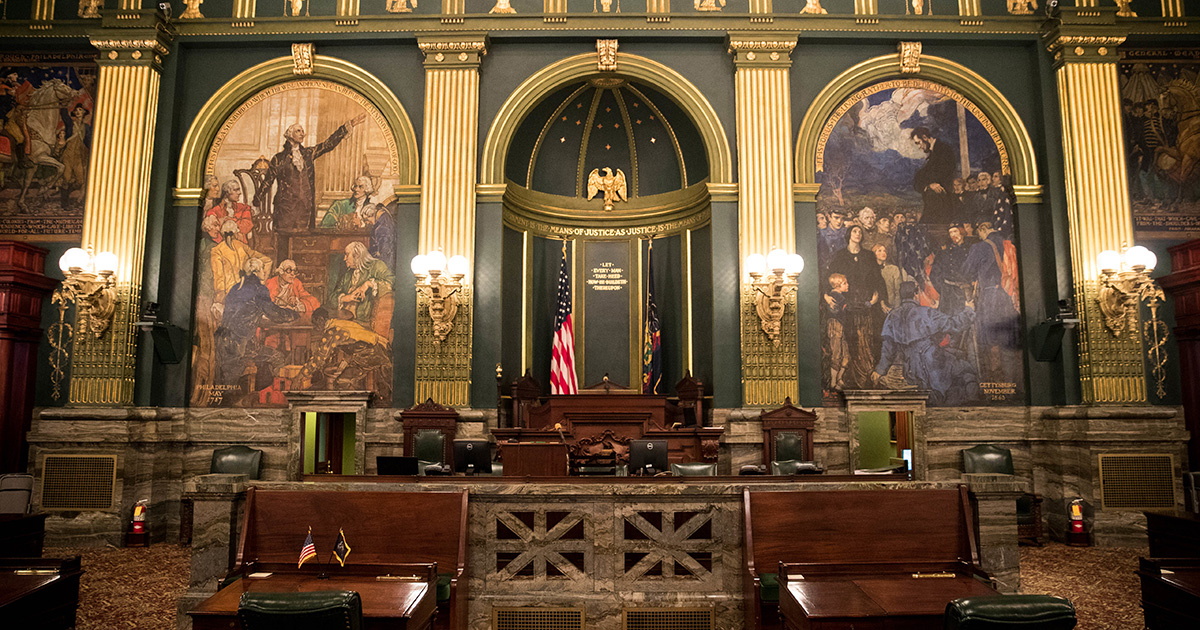
by Christin Brown | March 25, 2020 | News Releases
Philadelphia, PA, March 25, 2020 – State Senator Christine Tartaglione (D-Philadelphia) joined her Senate colleagues and members of the Pennsylvania House today as they unanimously adopted comprehensive COVID-19/coronavirus relief legislation for workers and employers throughout the Commonwealth.
Both chambers adopted an amended version of House Bill 68, which includes a provision that enables displaced workers to obtain unemployment compensation sooner, and a provision that relieves employers of unemployment benefits charges in instances where the coronavirus emergency caused the employee layoff.
“Just as the thousands of individuals afflicted by this illness need time and resources to recover, displaced workers and their employers need time and resources to get back on their feet again,” Senator Tartaglione said during the Senate’s remote legislative session. “This legislation provides them with the time and resources they need by helping to mitigate the financial setbacks caused by the coronavirus.”
As amended, HB 68 codifies the Wolf administration’s waiver of the one-week waiting period usually required for displaced workers before they may apply for unemployment benefits. The waiting period waiver will remain in effect for the duration of the coronavirus emergency declaration. The bill also codifies the administration’s suspension of the work search and registration requirements of the Commonwealth’s unemployment compensation law during the emergency.
To ensure that displaced workers receive comprehensive and timely information about the availability of unemployment benefits, the amended HB 68 requires employers to notify employees upon separation from the company of the availability of unemployment compensation, the employee’s ability to file a benefits claim, website information for filing a claim, and the information that the employee must provide to submit a claim.
The amended bill further requires the Department of Labor & Industry to provide companies relief from unemployment benefit charges in cases where the employee separation resulted directly from coronavirus or from restrictions implemented by the government in response to the pandemic. In addition, the bill extends the window for employers to request full relief from benefit charges from 15 days to 21 days.
The Department of Labor Industry projects that the bill will result in an increase of $6 million in relief from benefit charges granted to employers, as well as a reduction of $1 million annually in unemployment compensation contributions by employers.
# # #
If you would like more information about this topic, please contact William Kenny at 215-533-0440 or William.Kenny@pasenate.com.




































